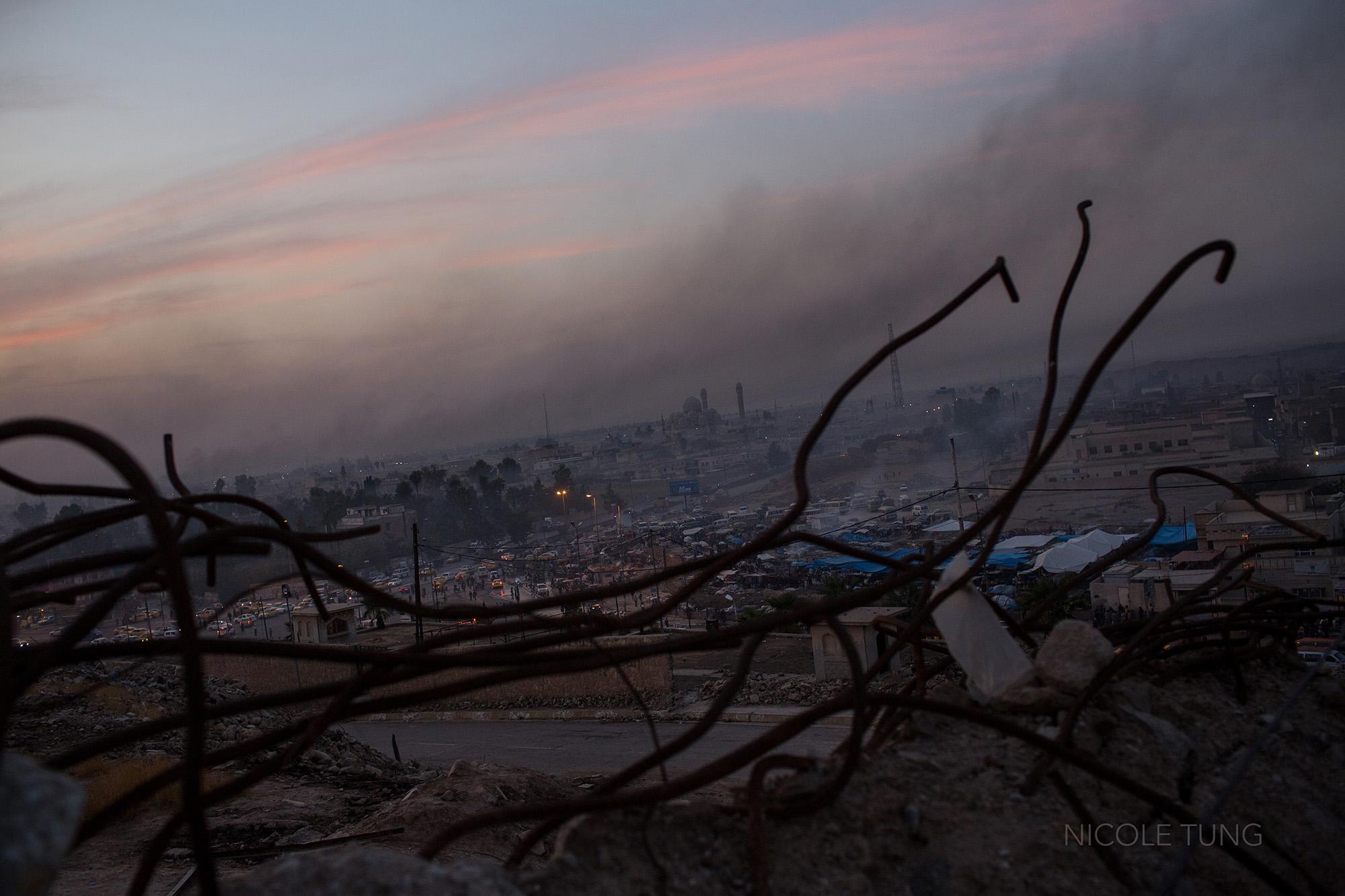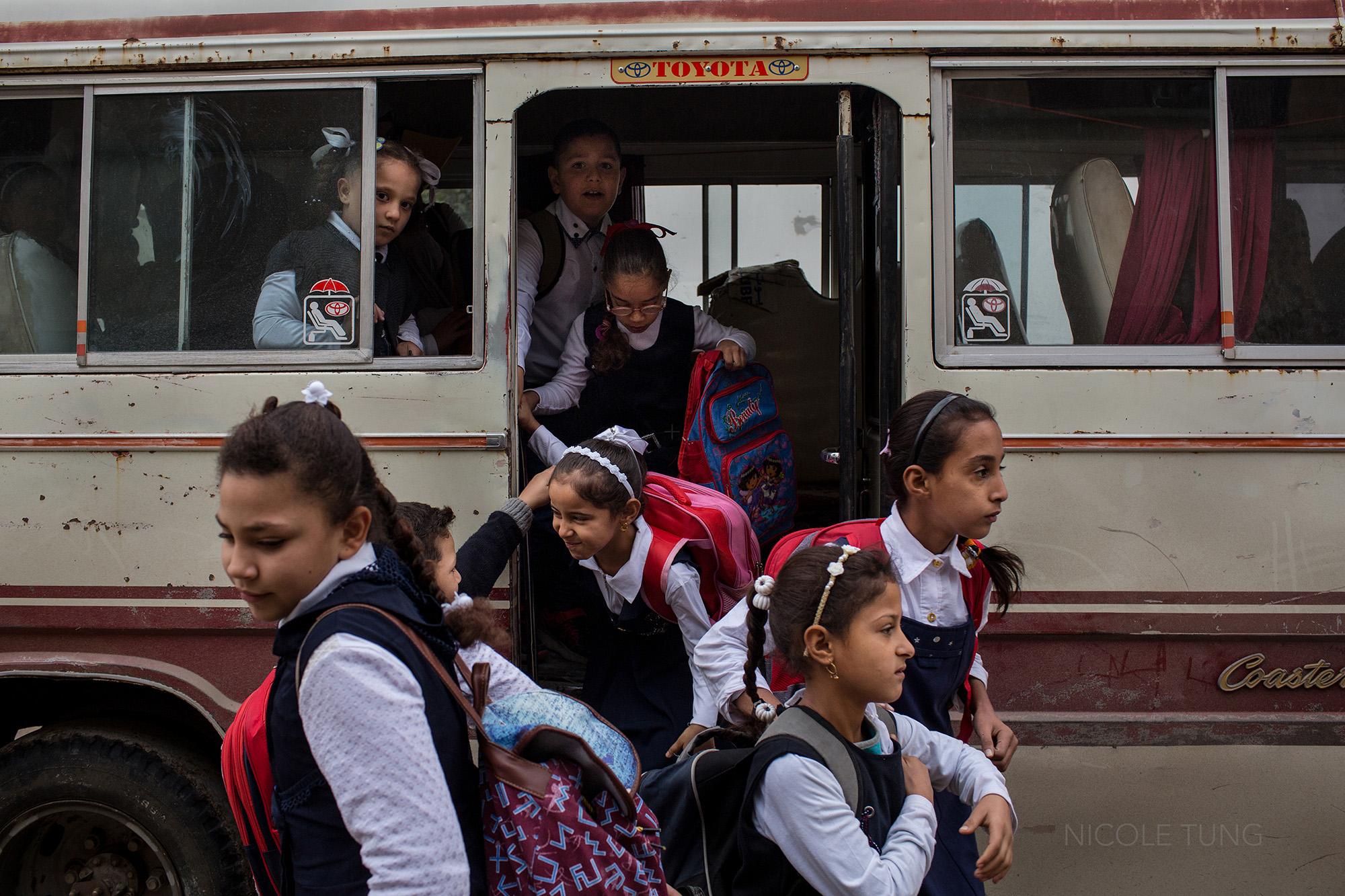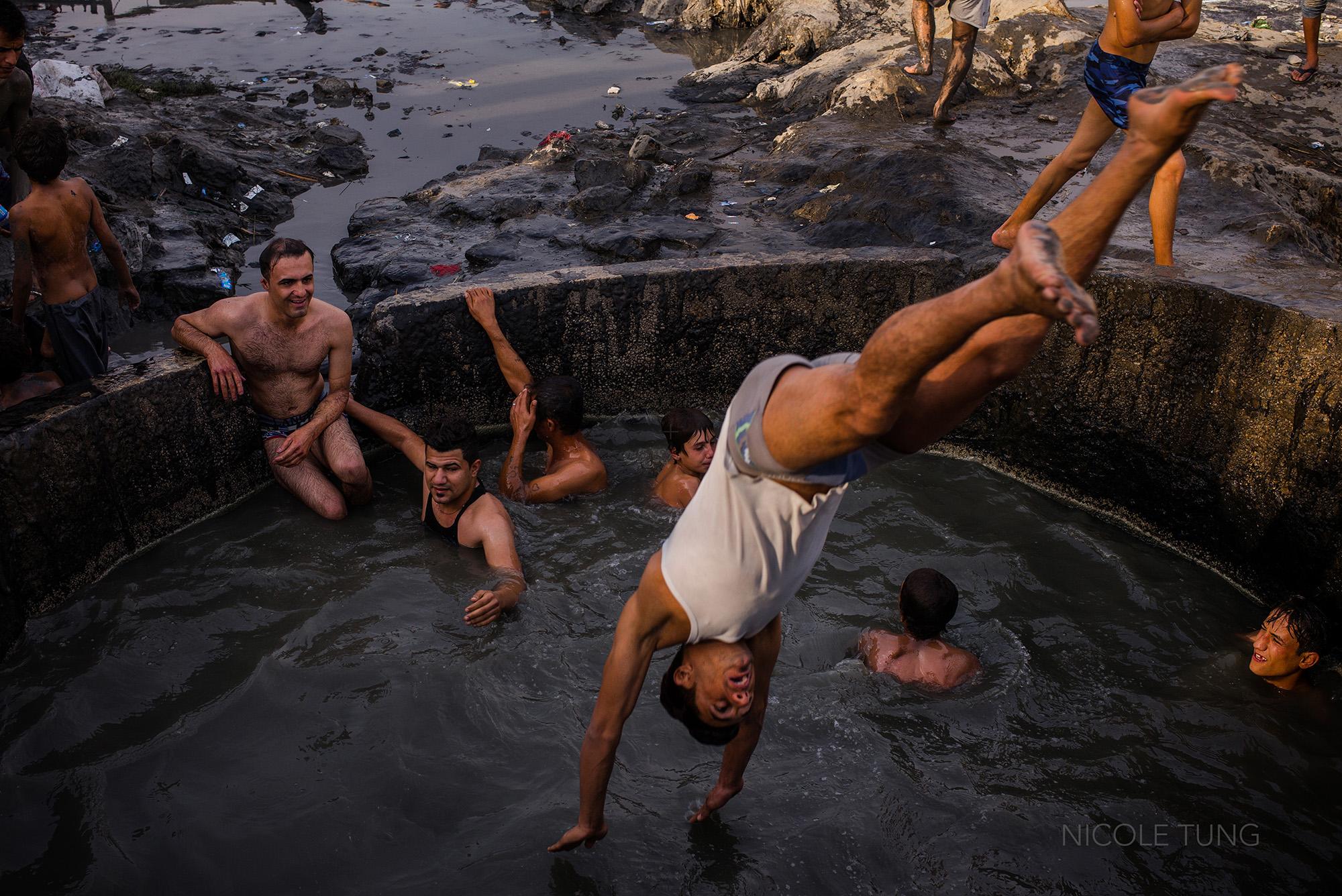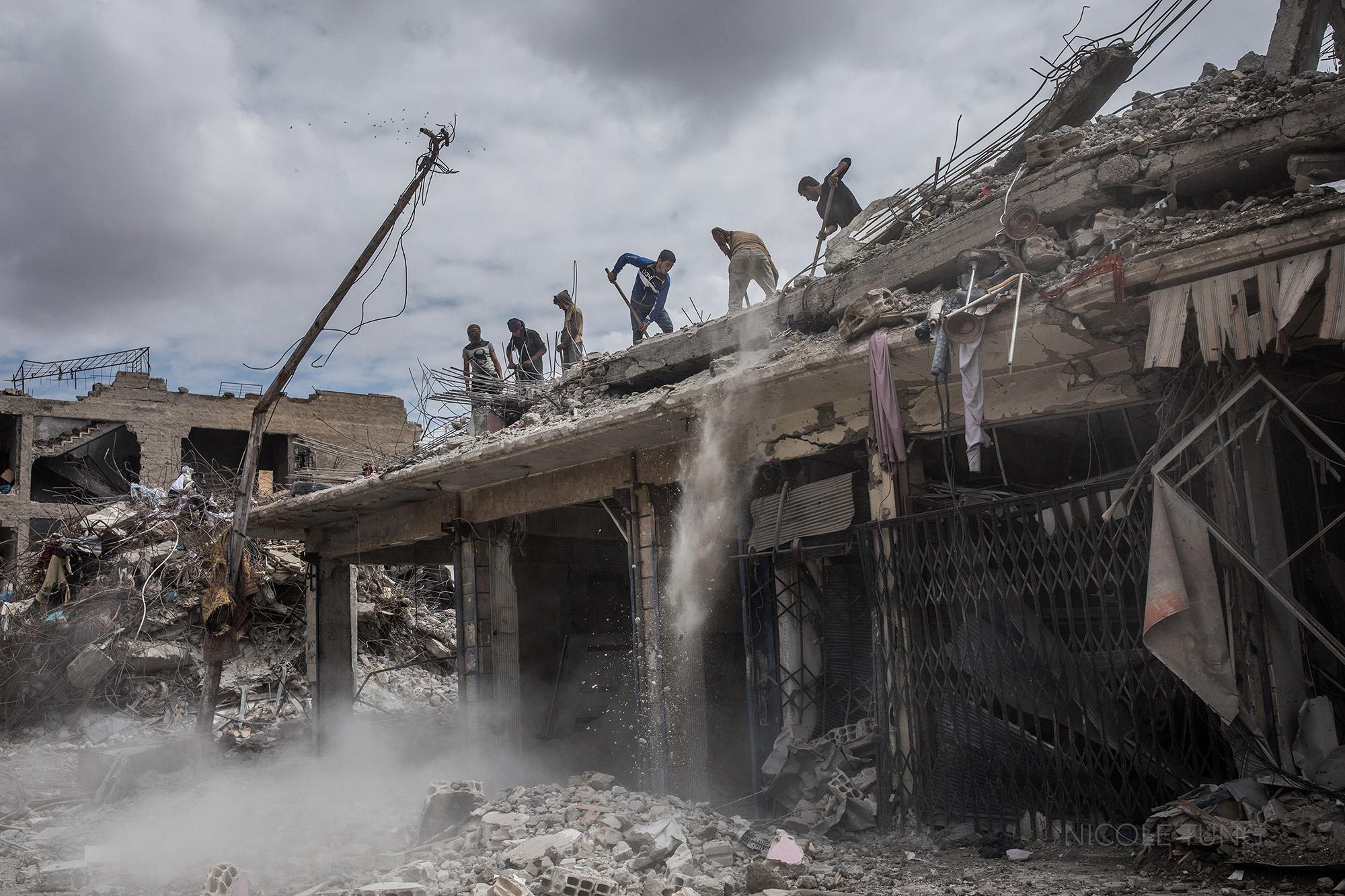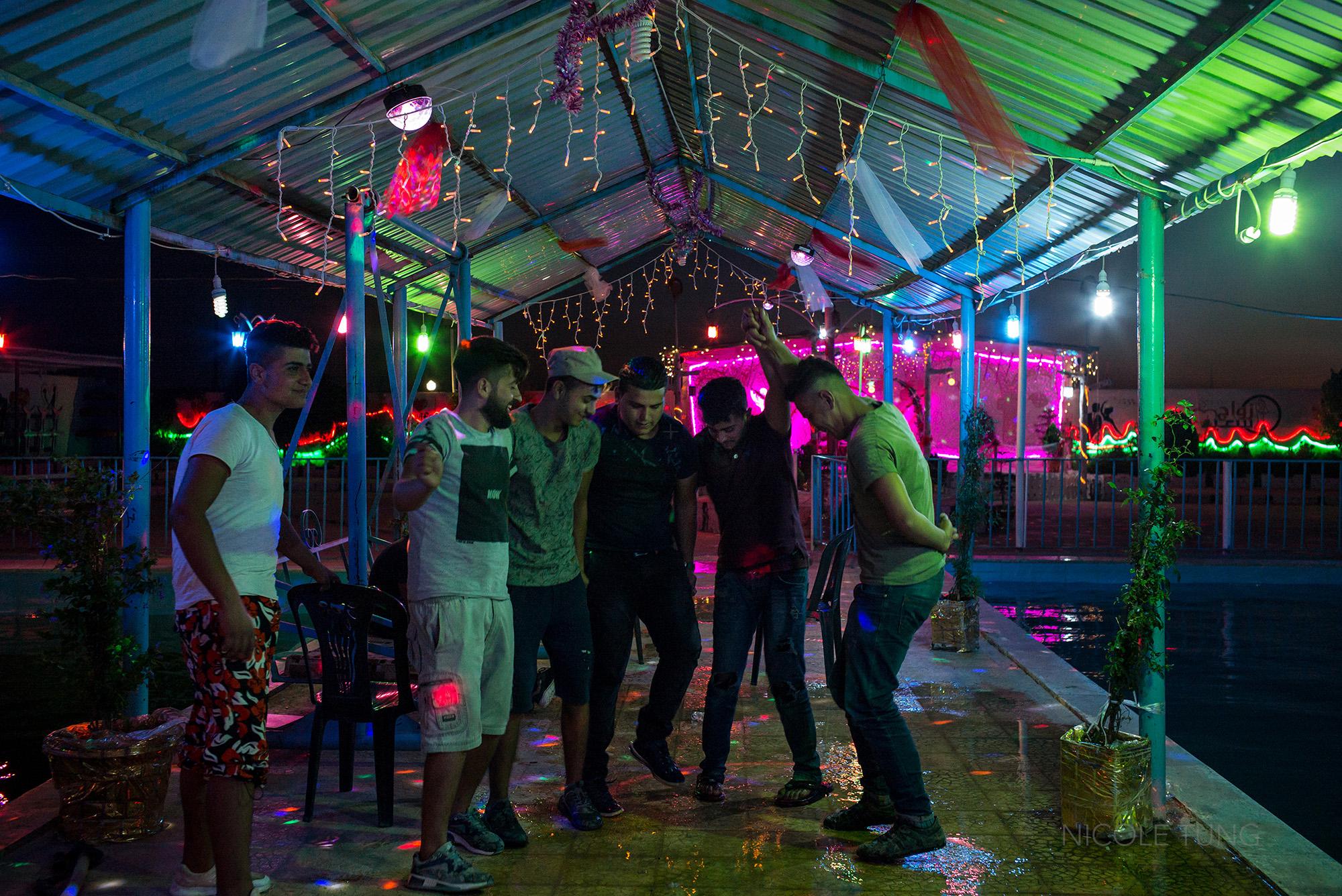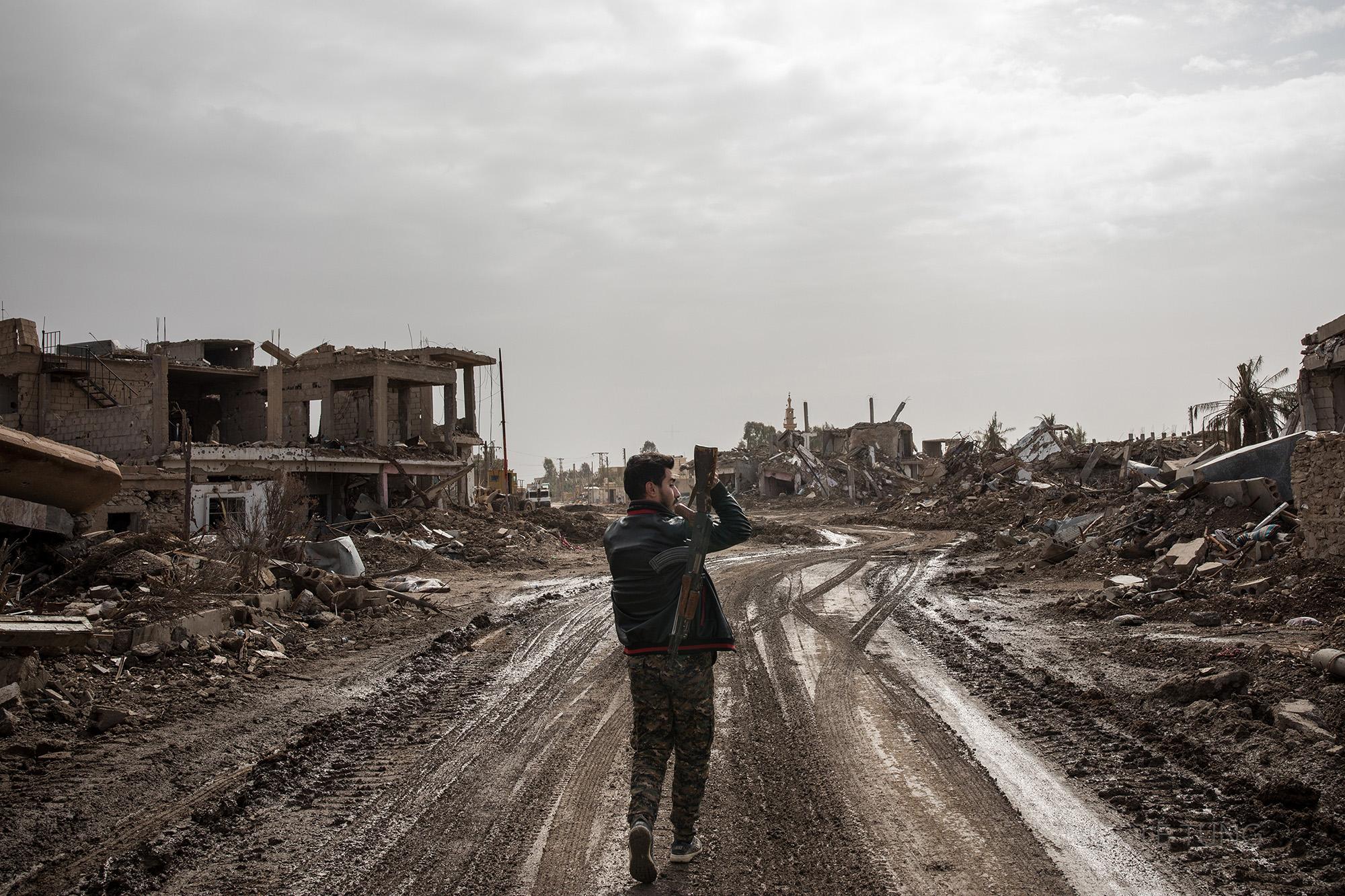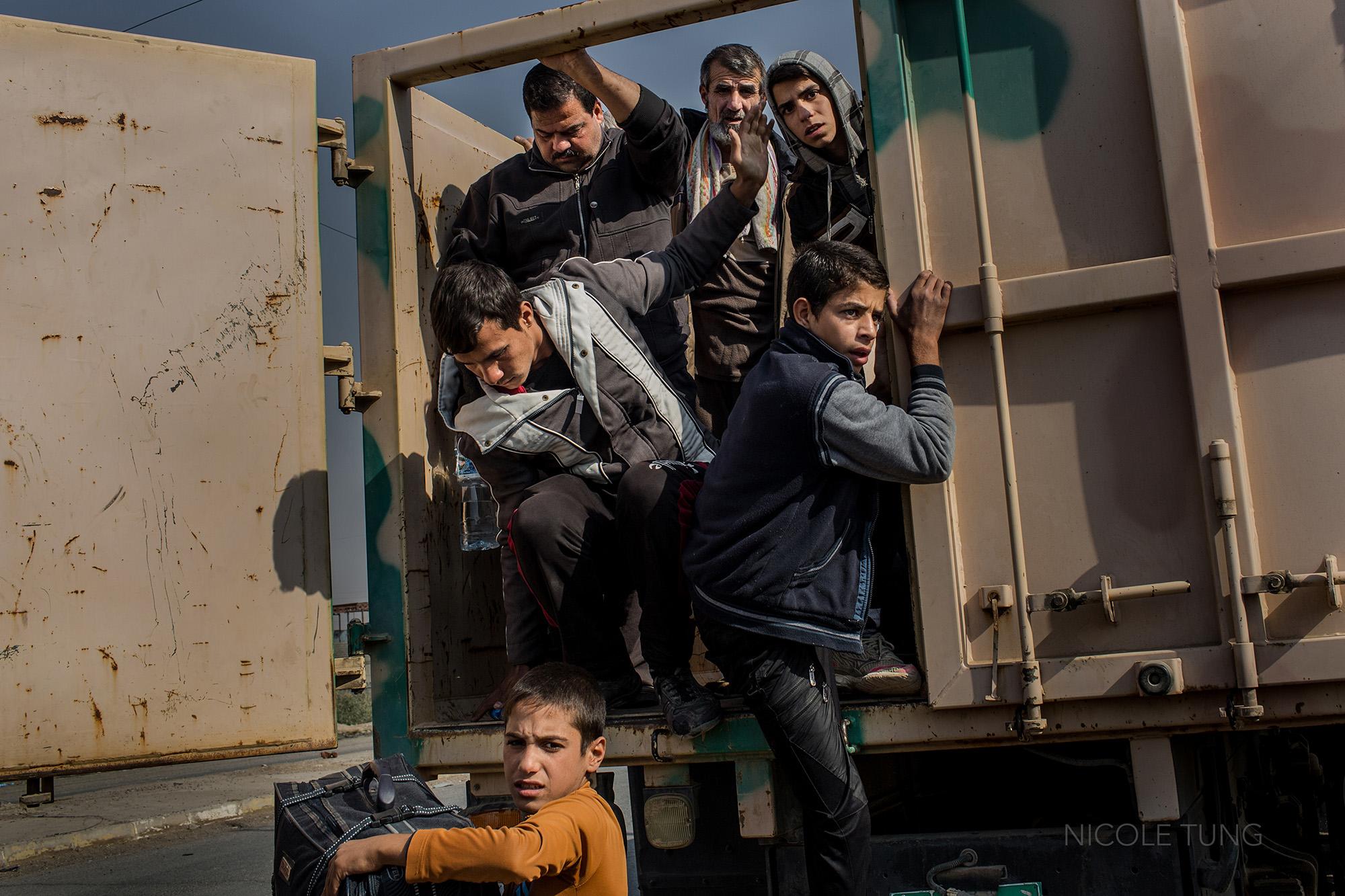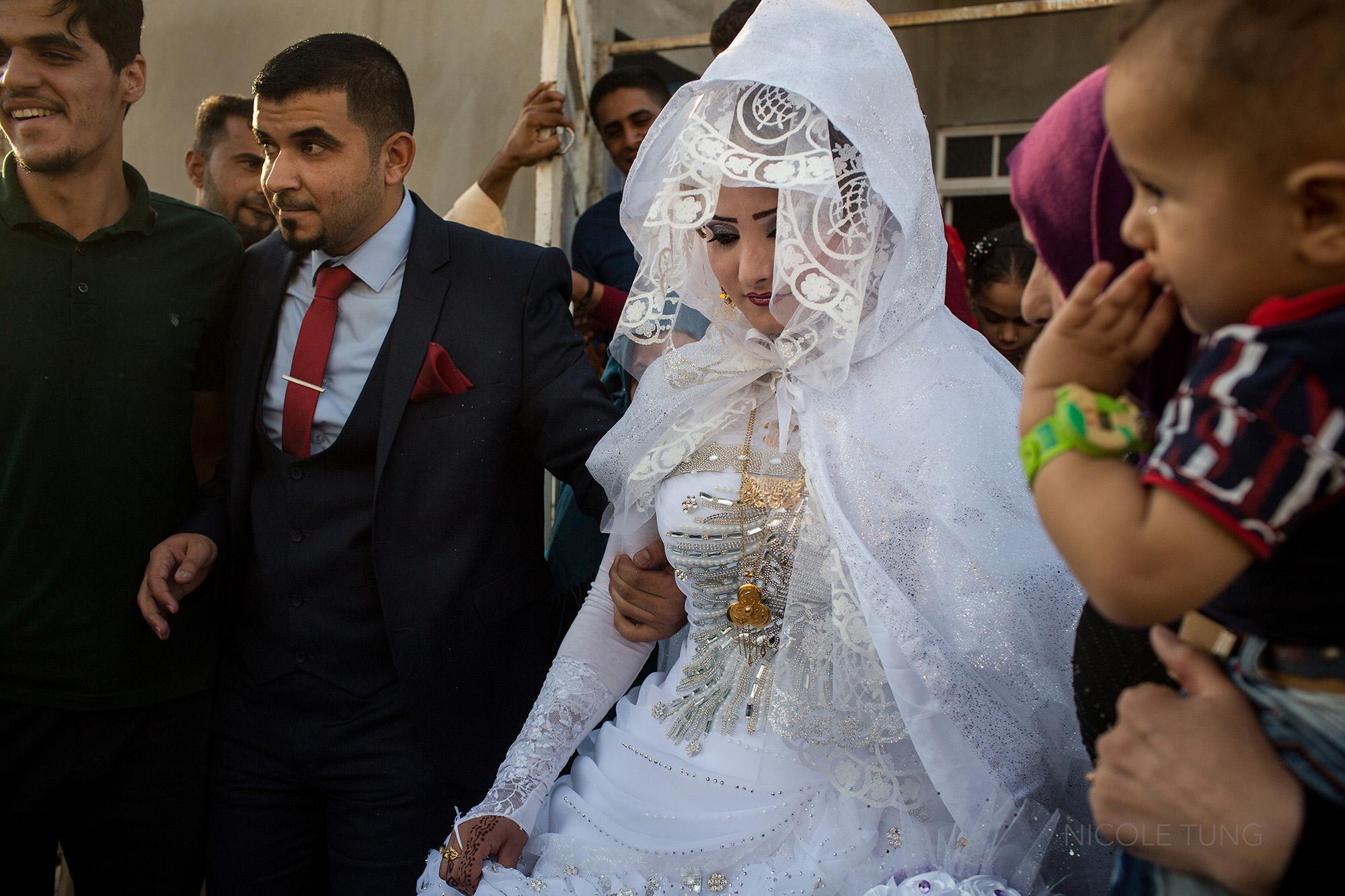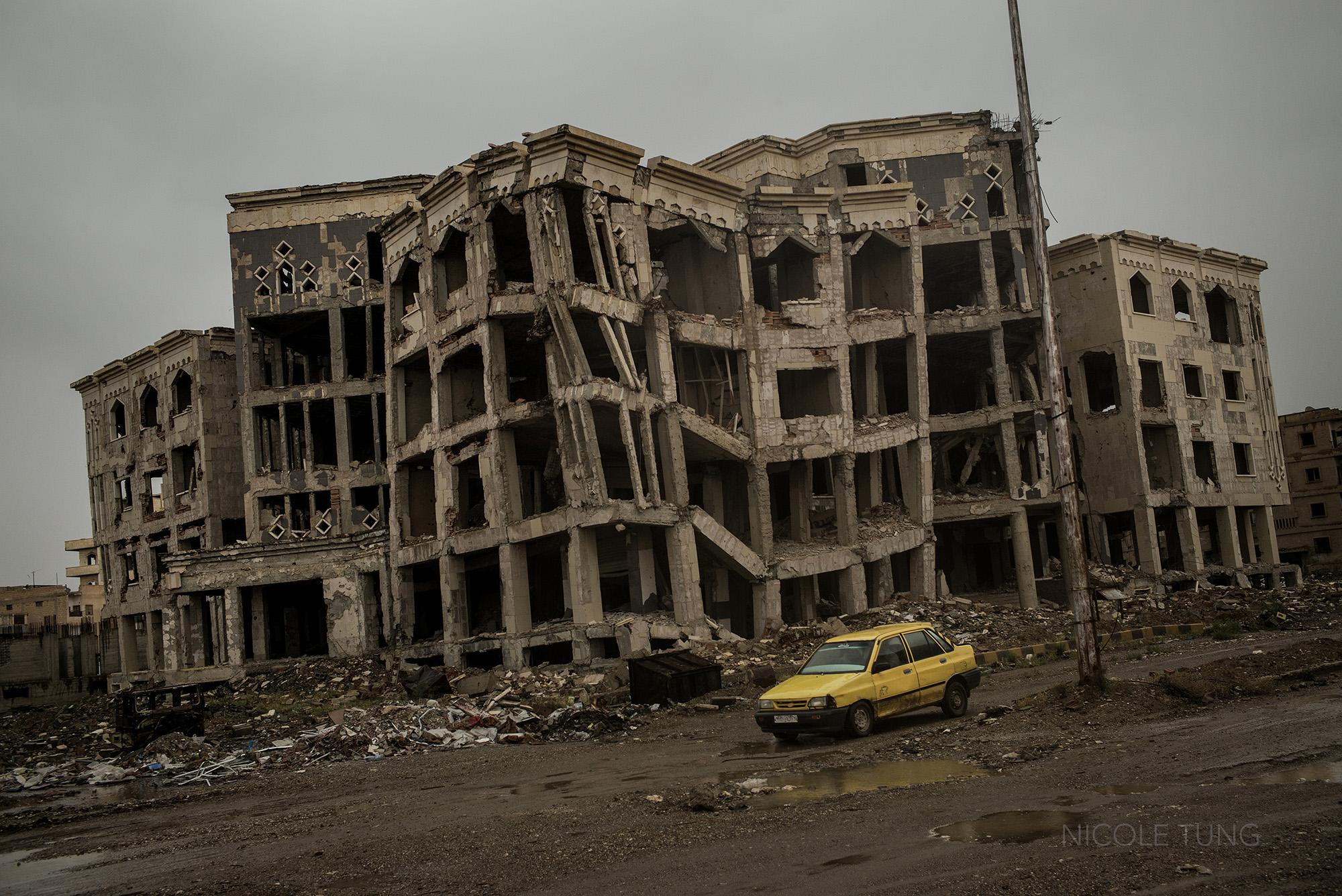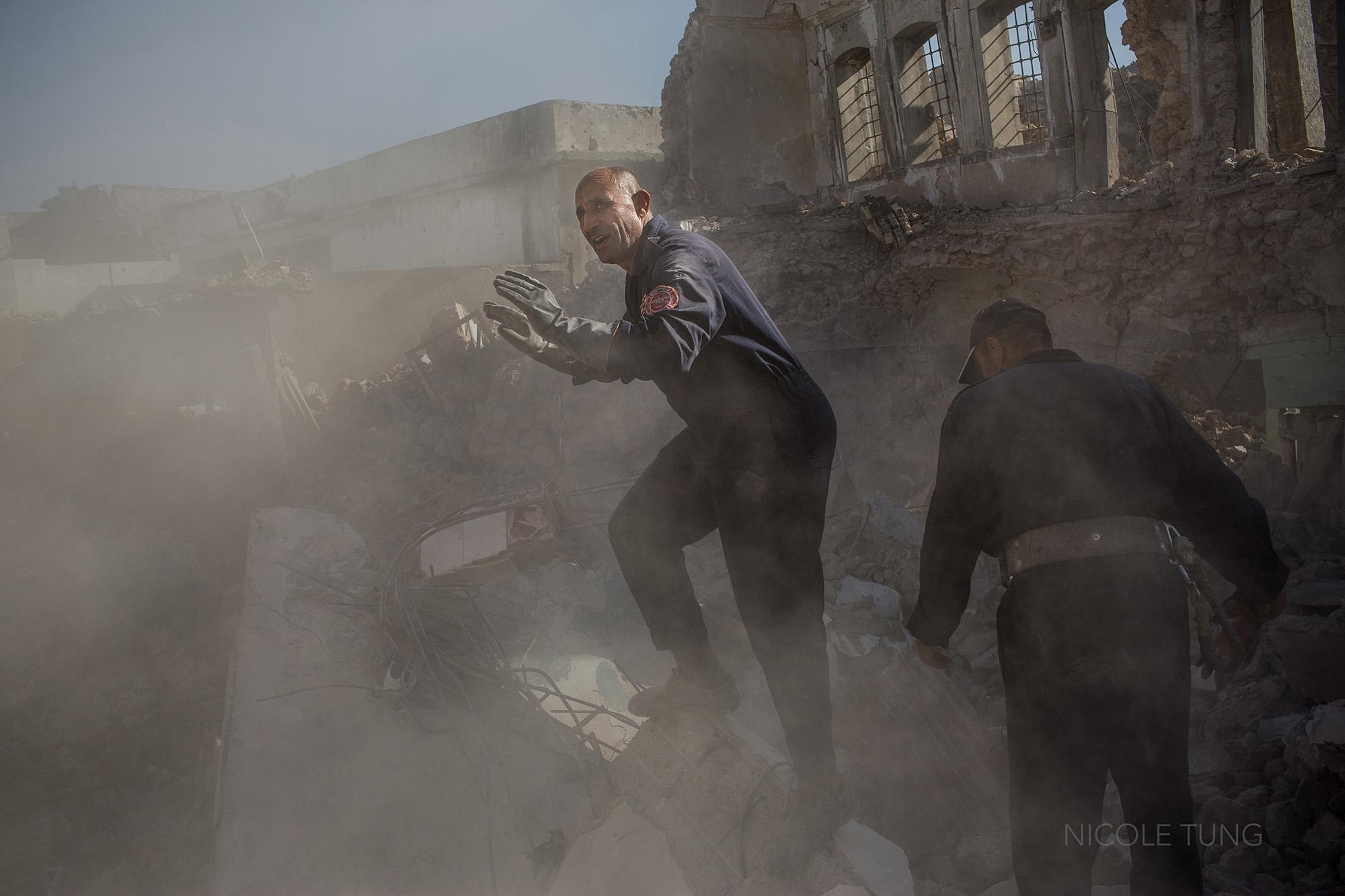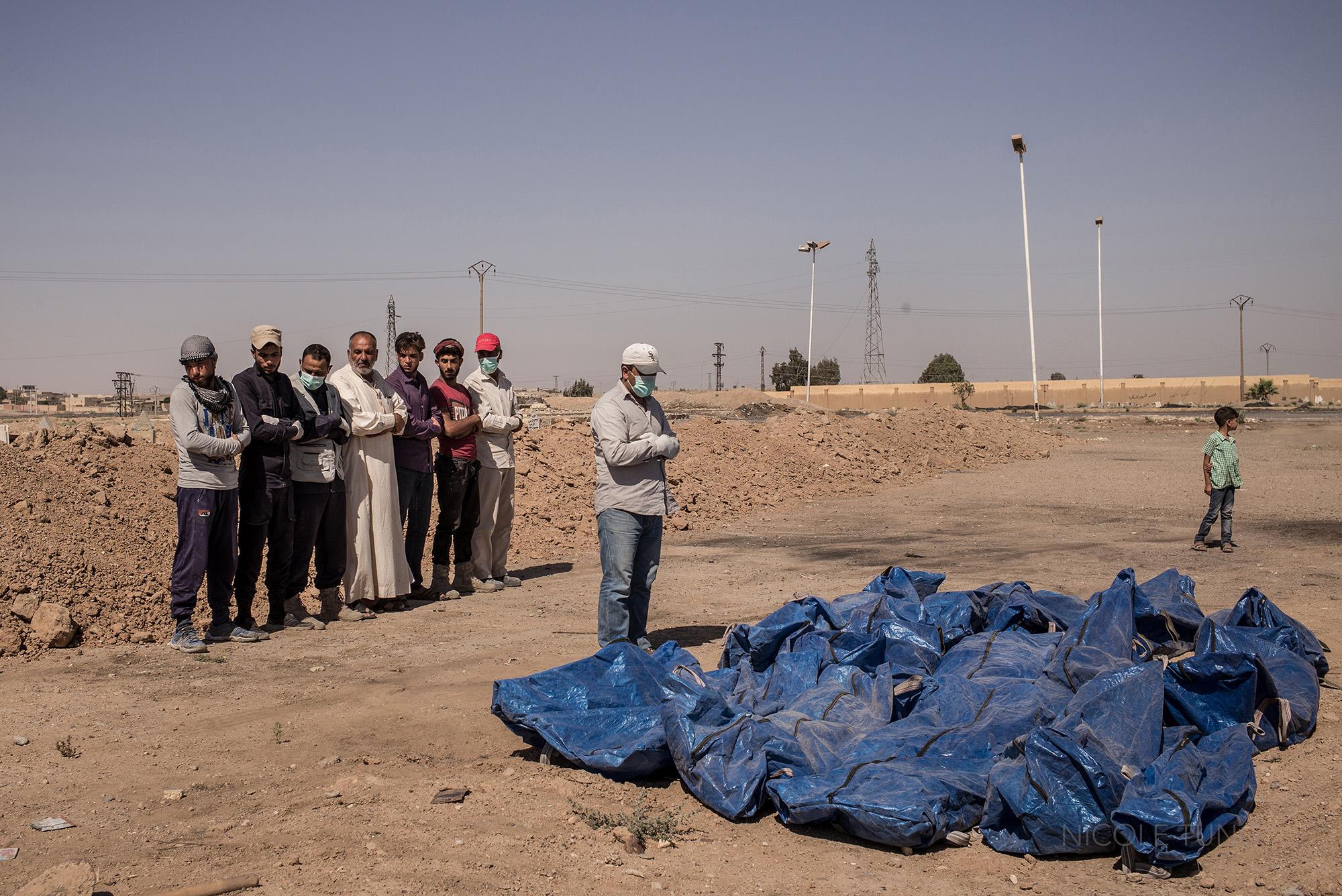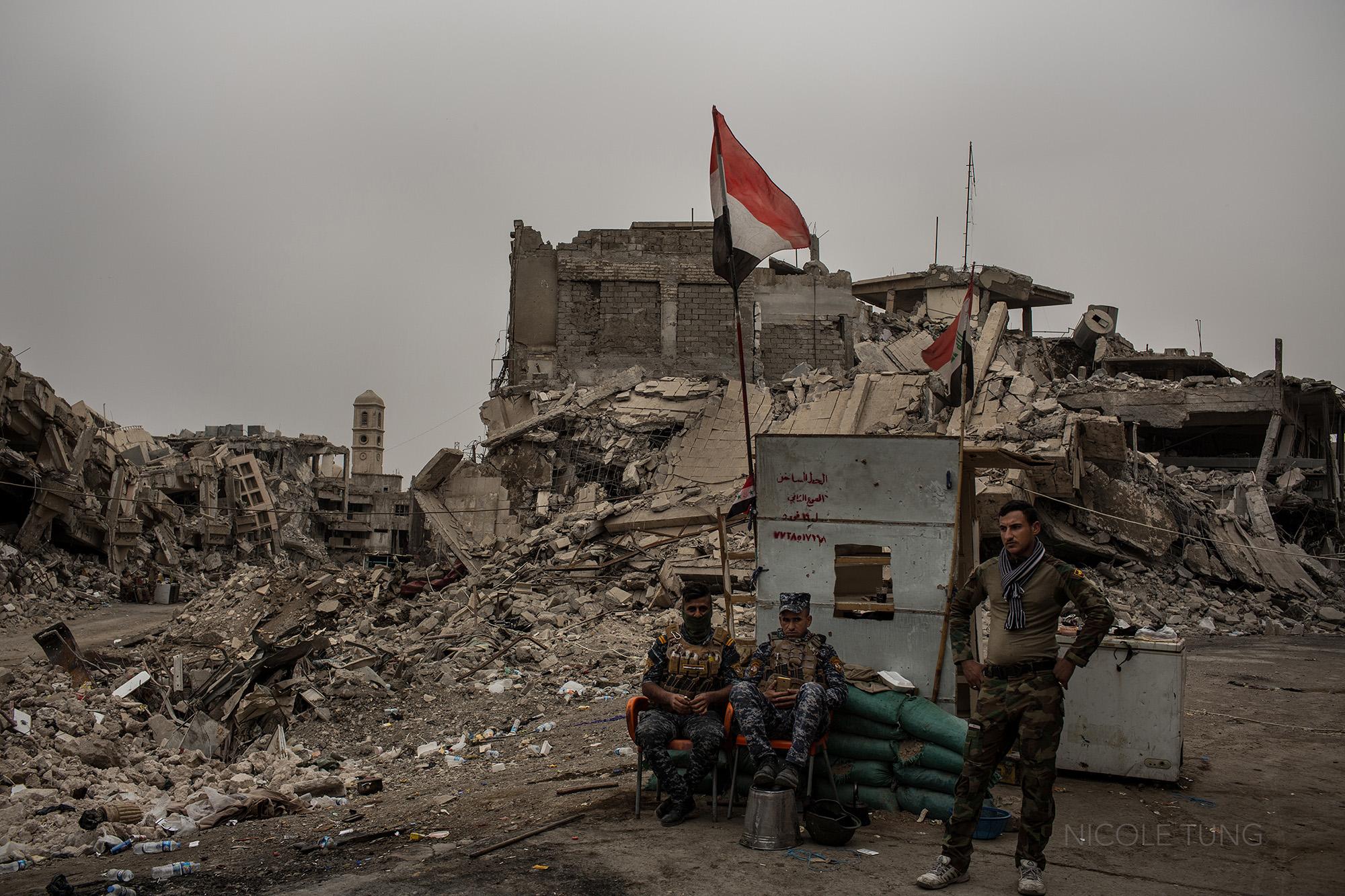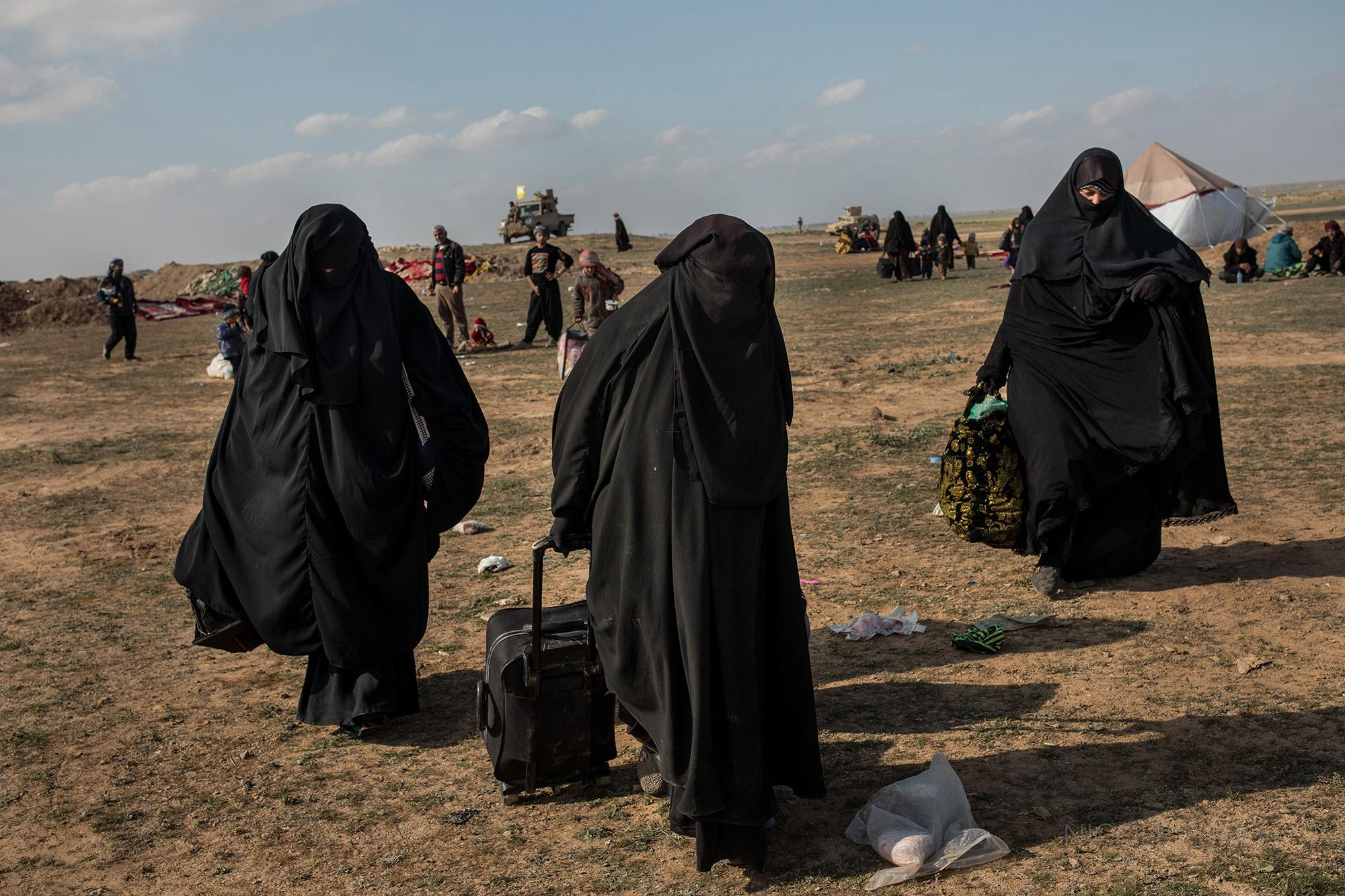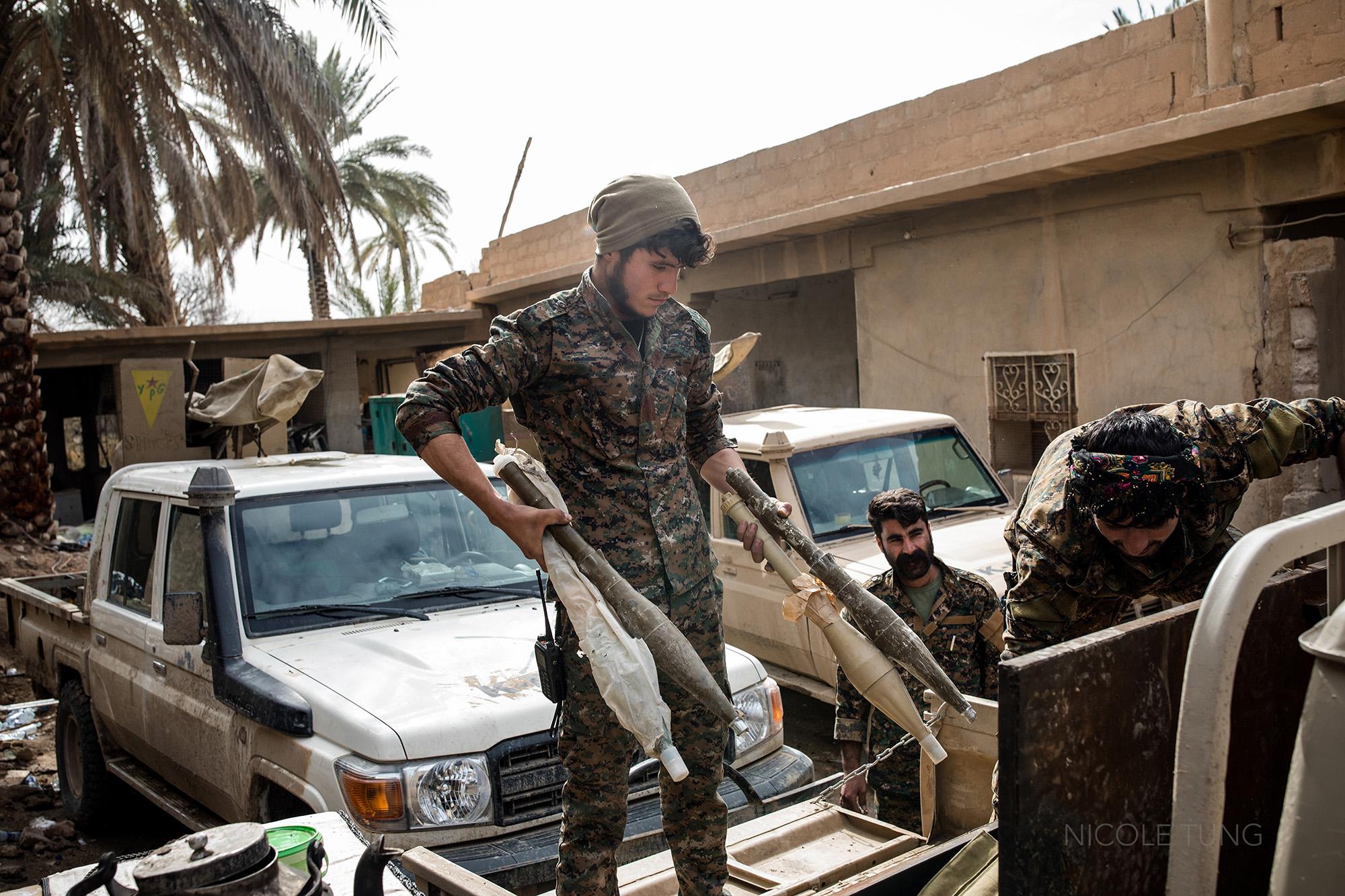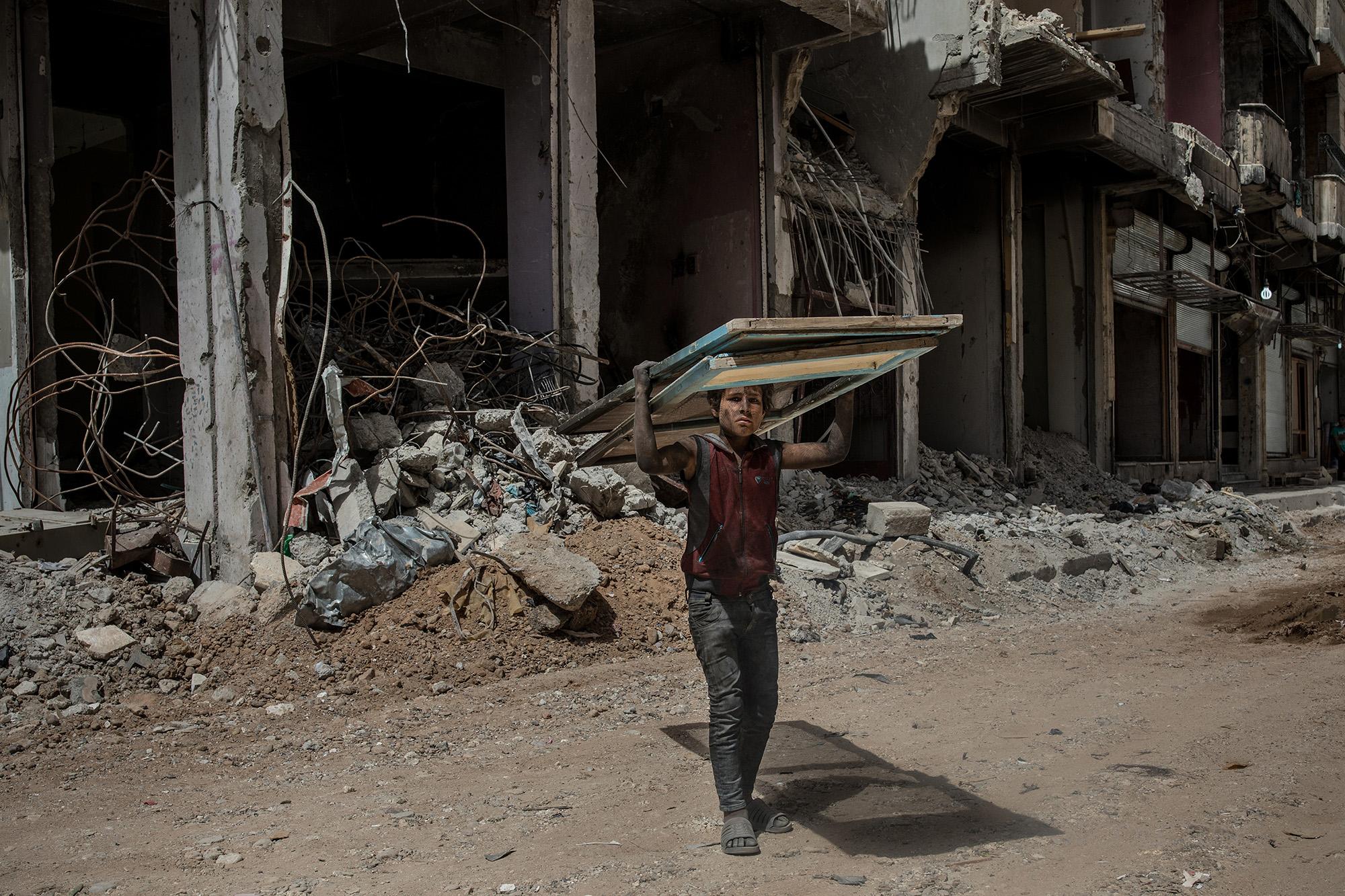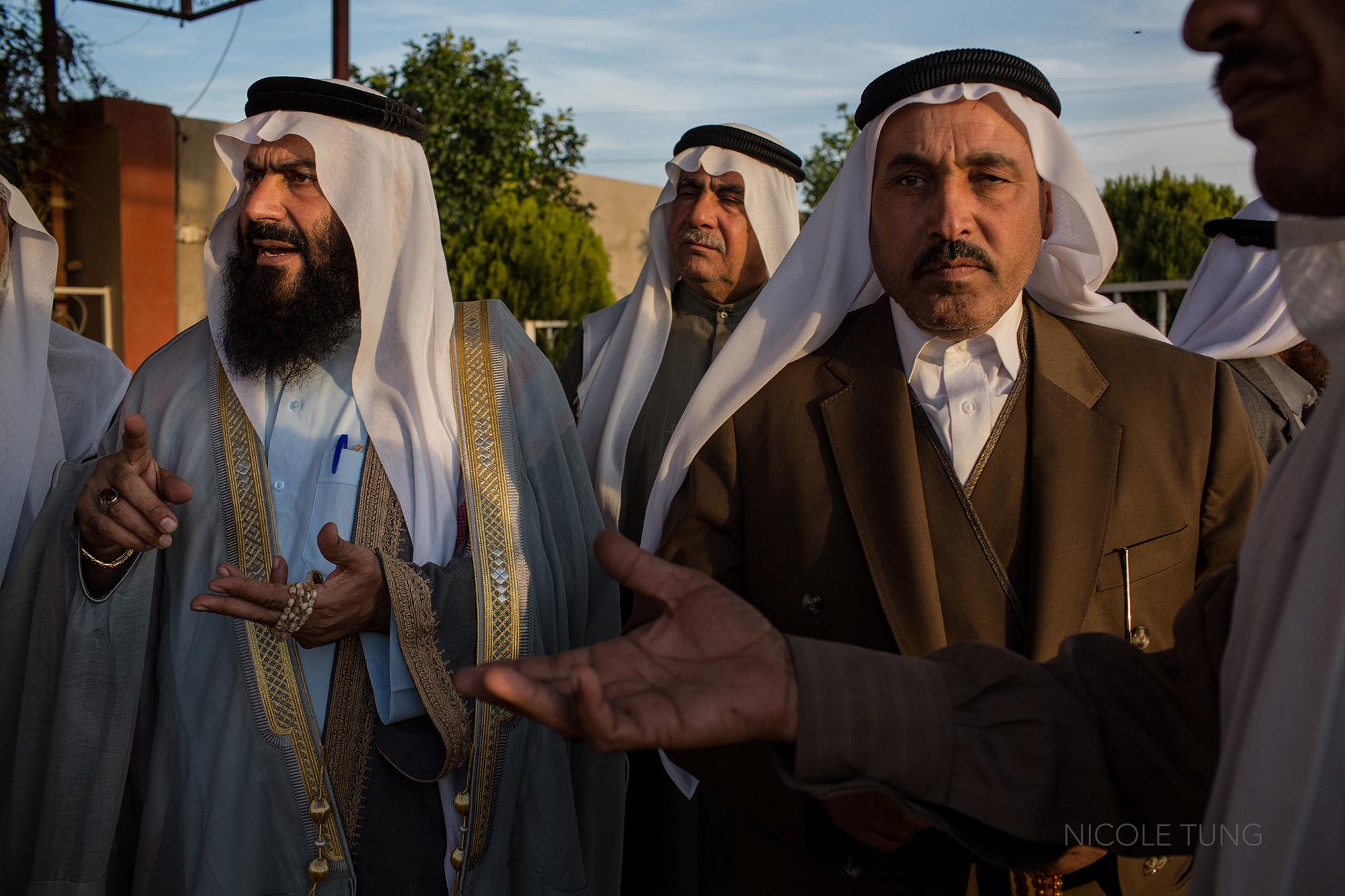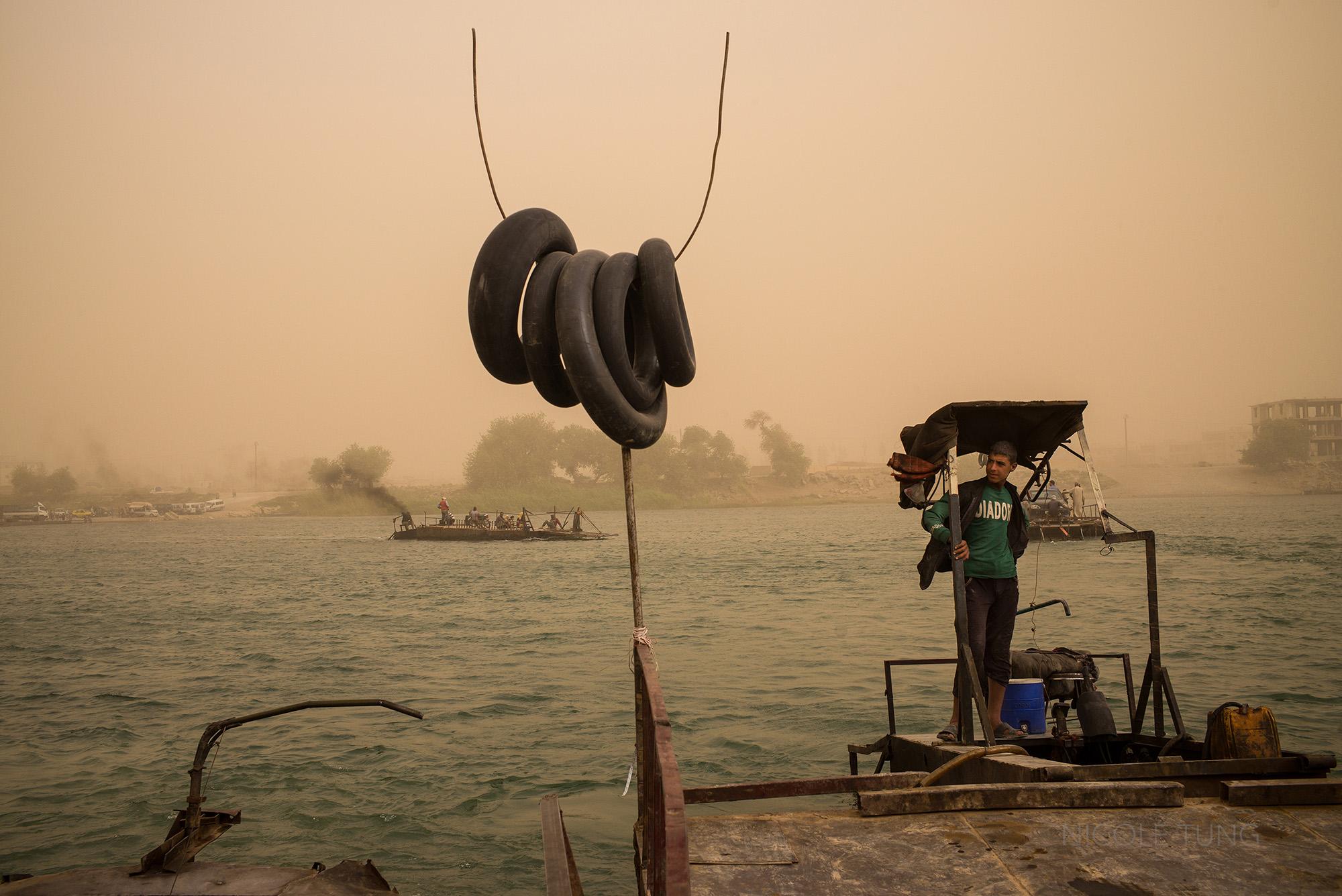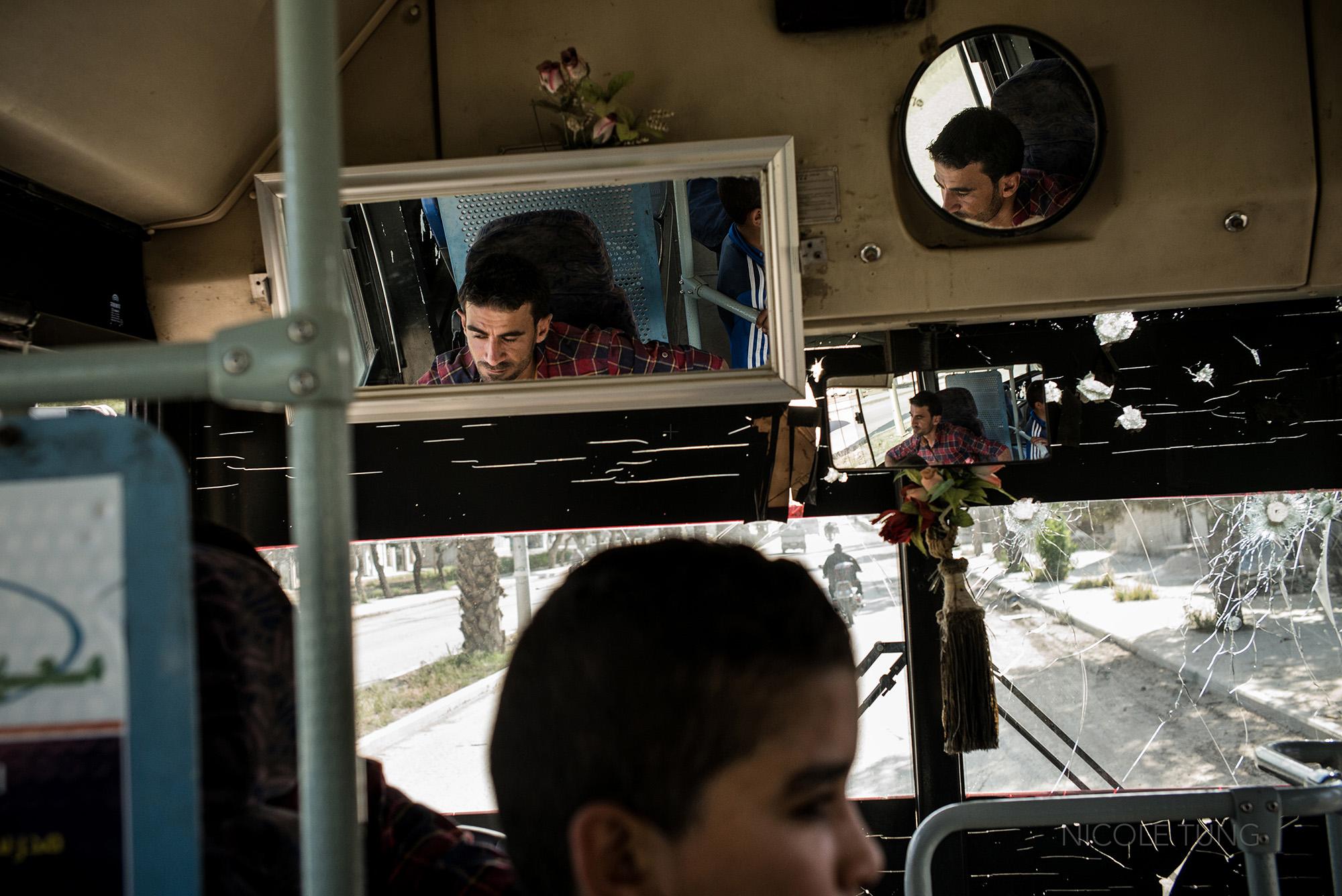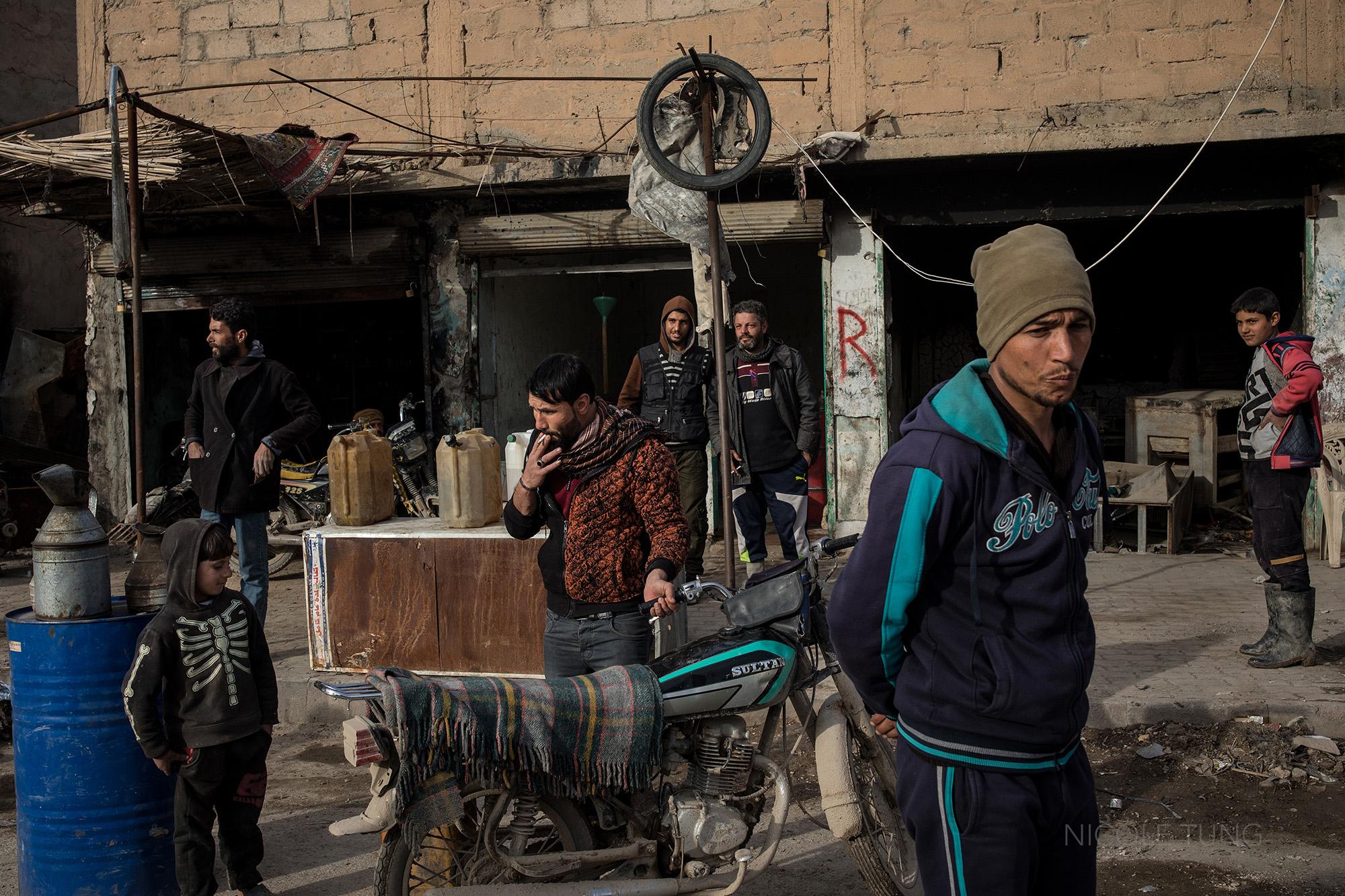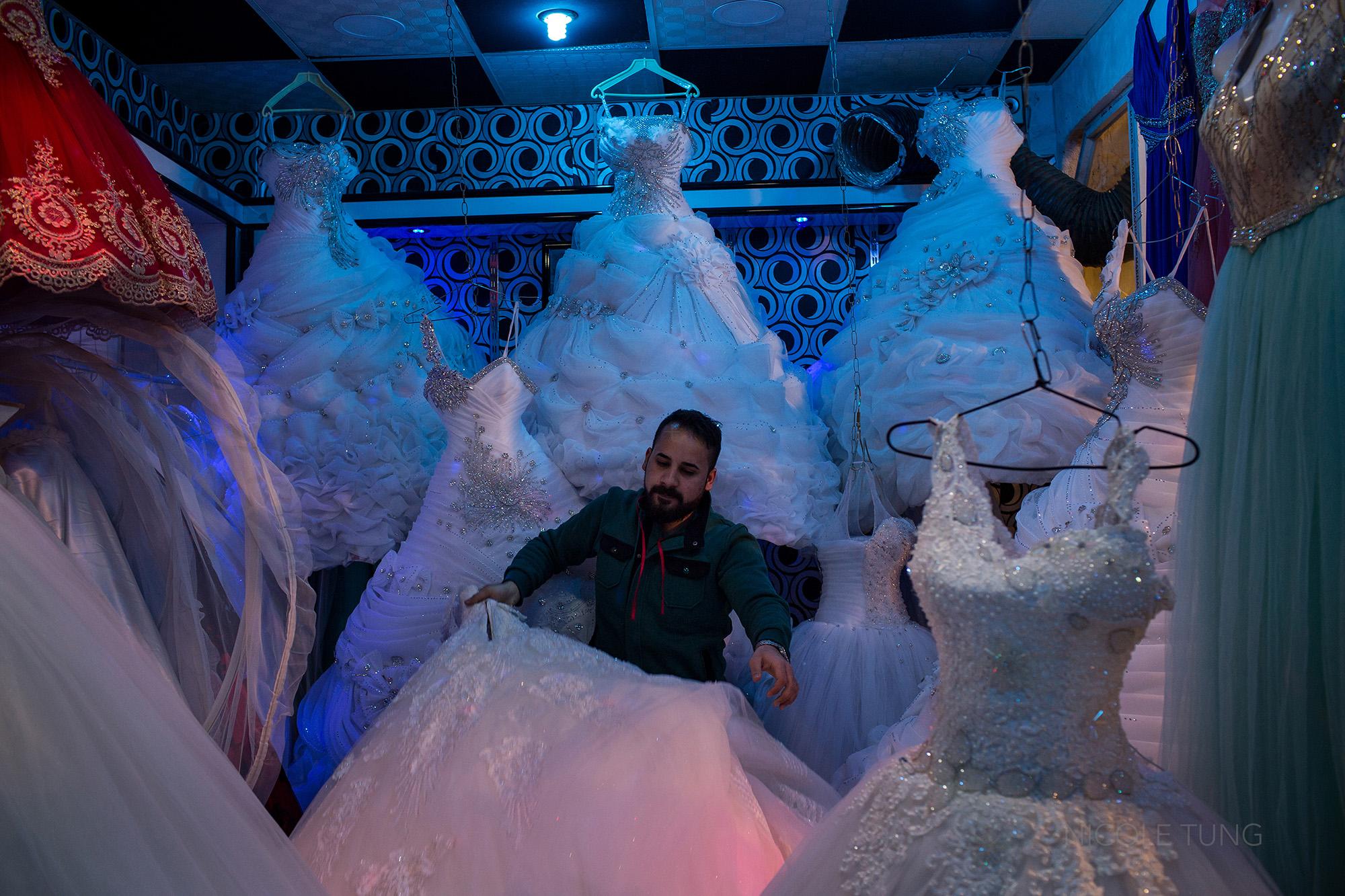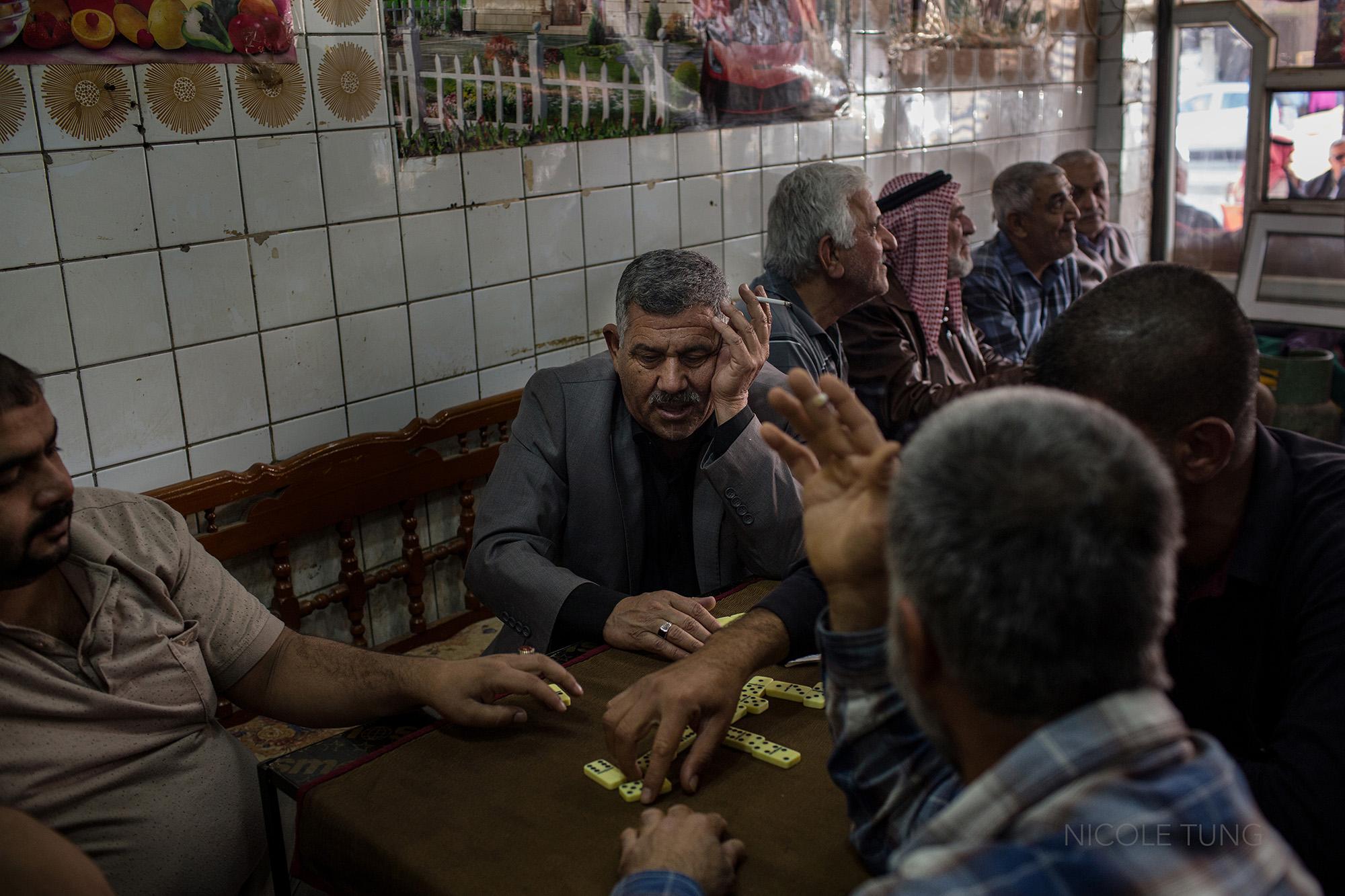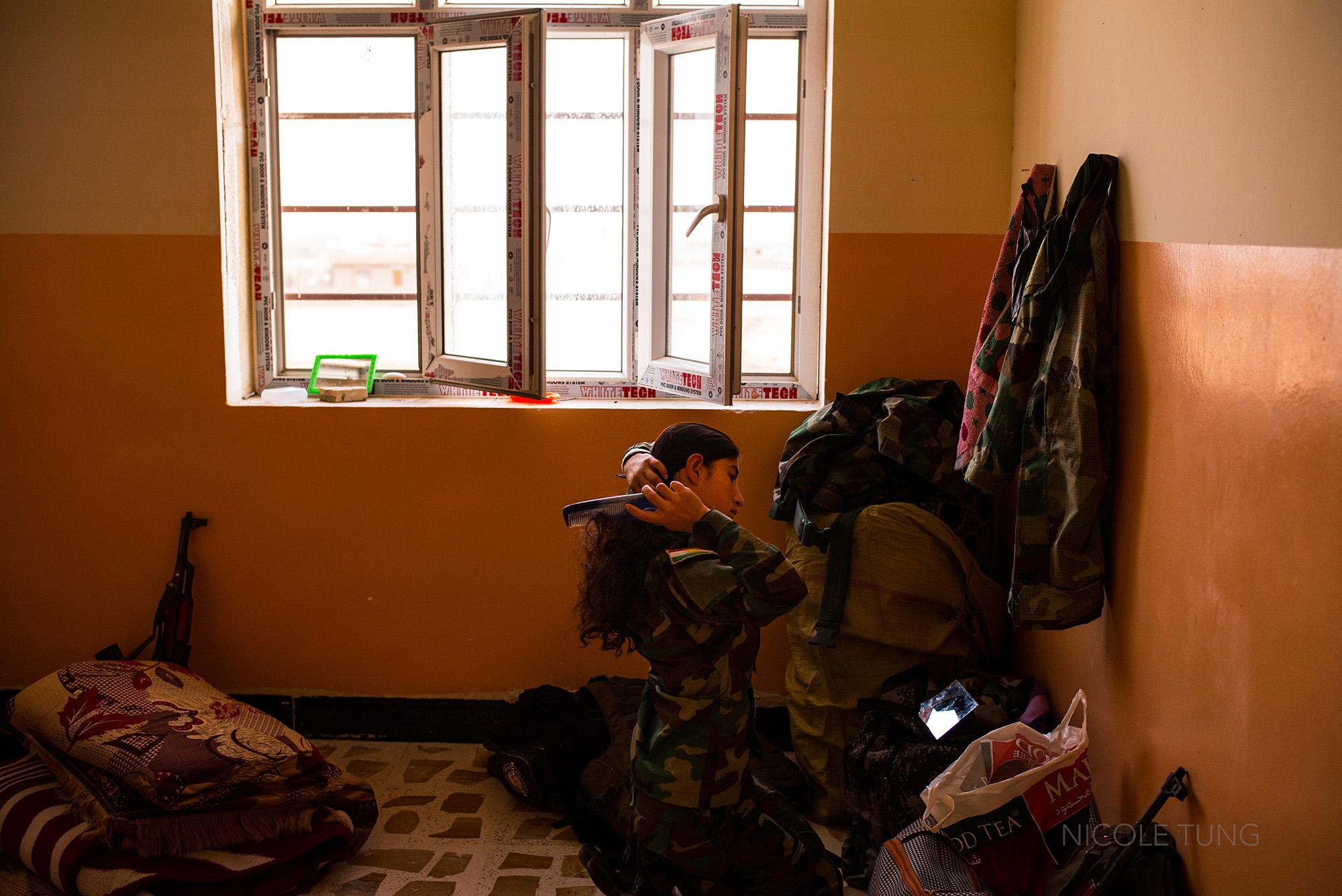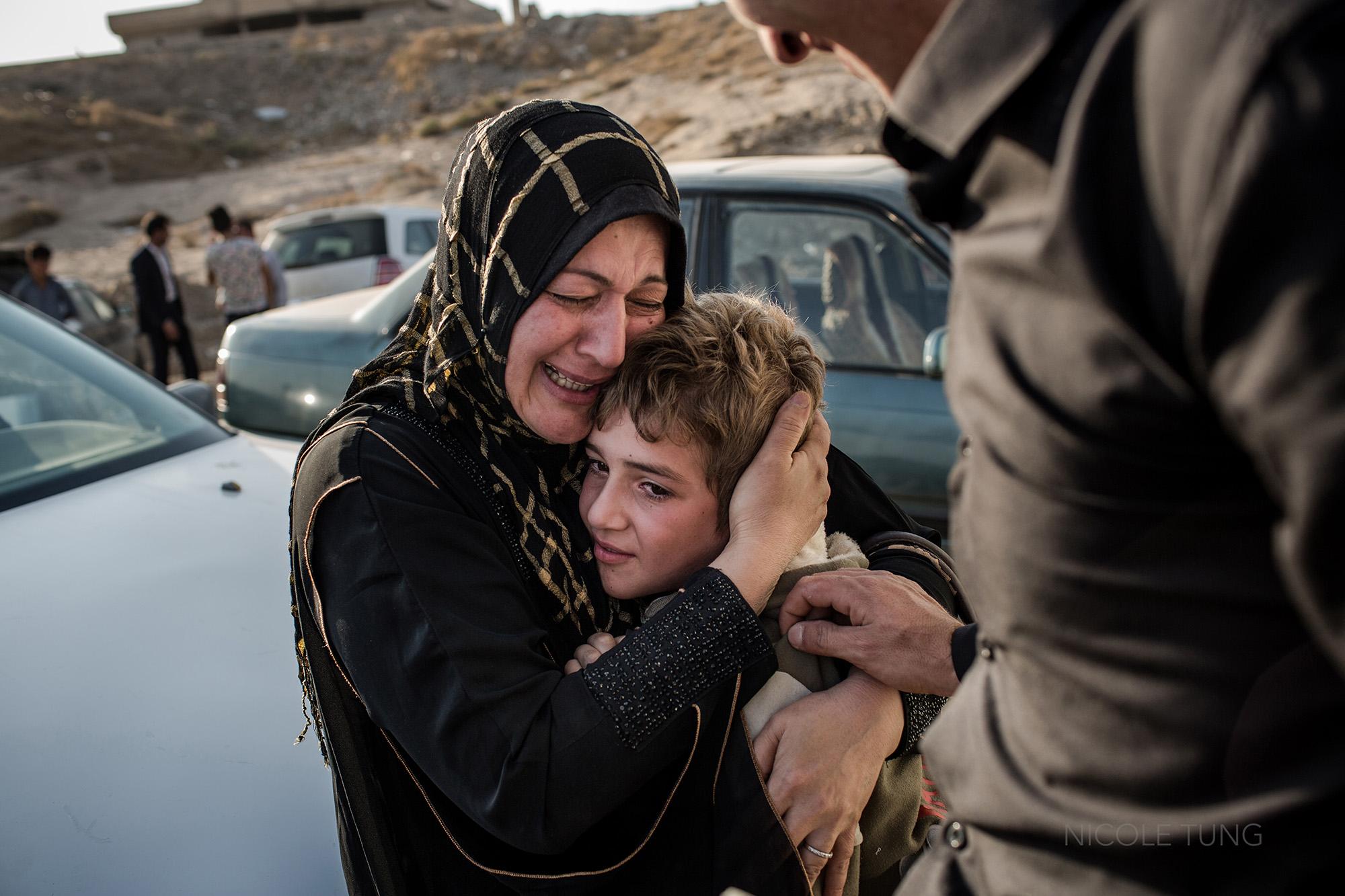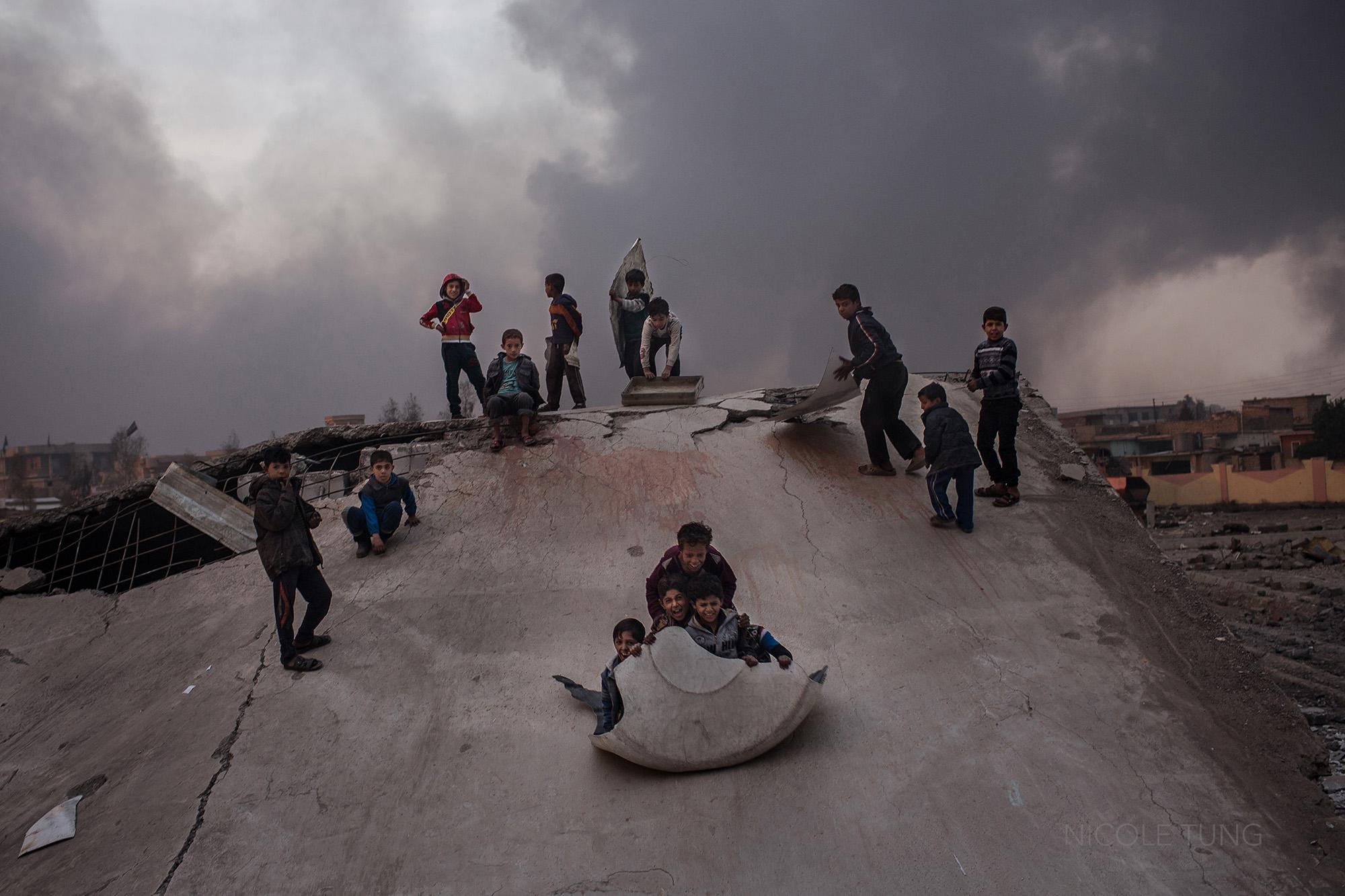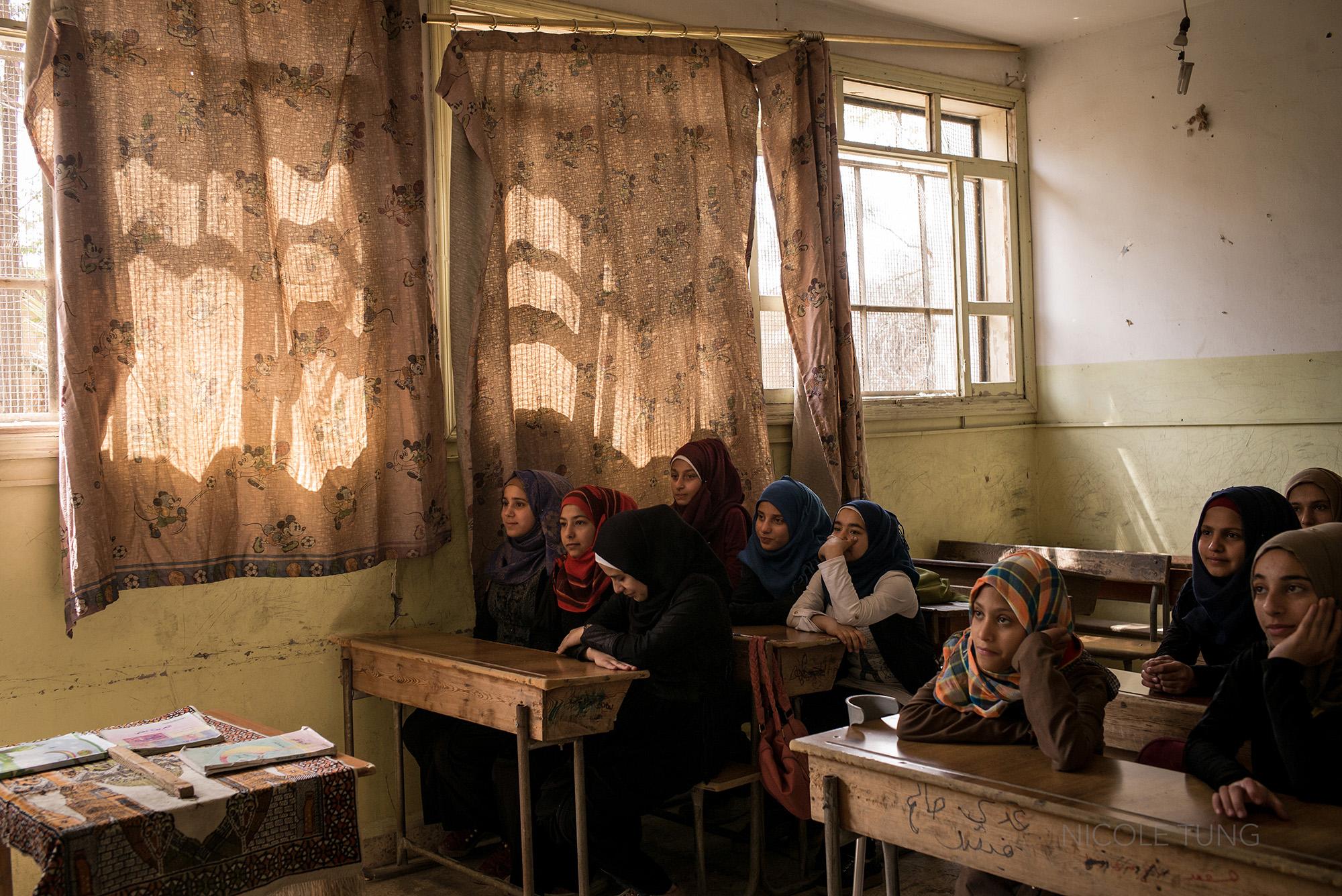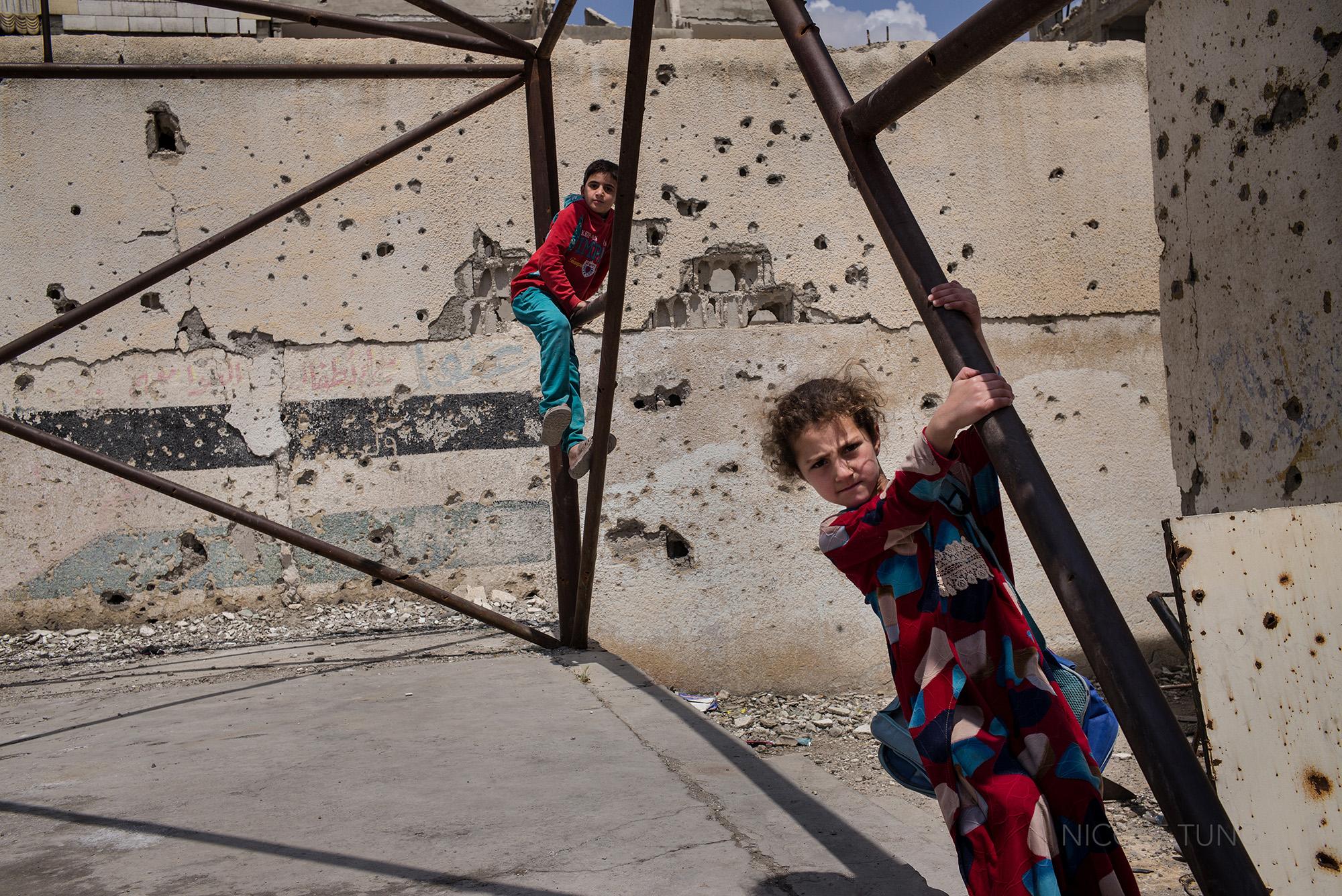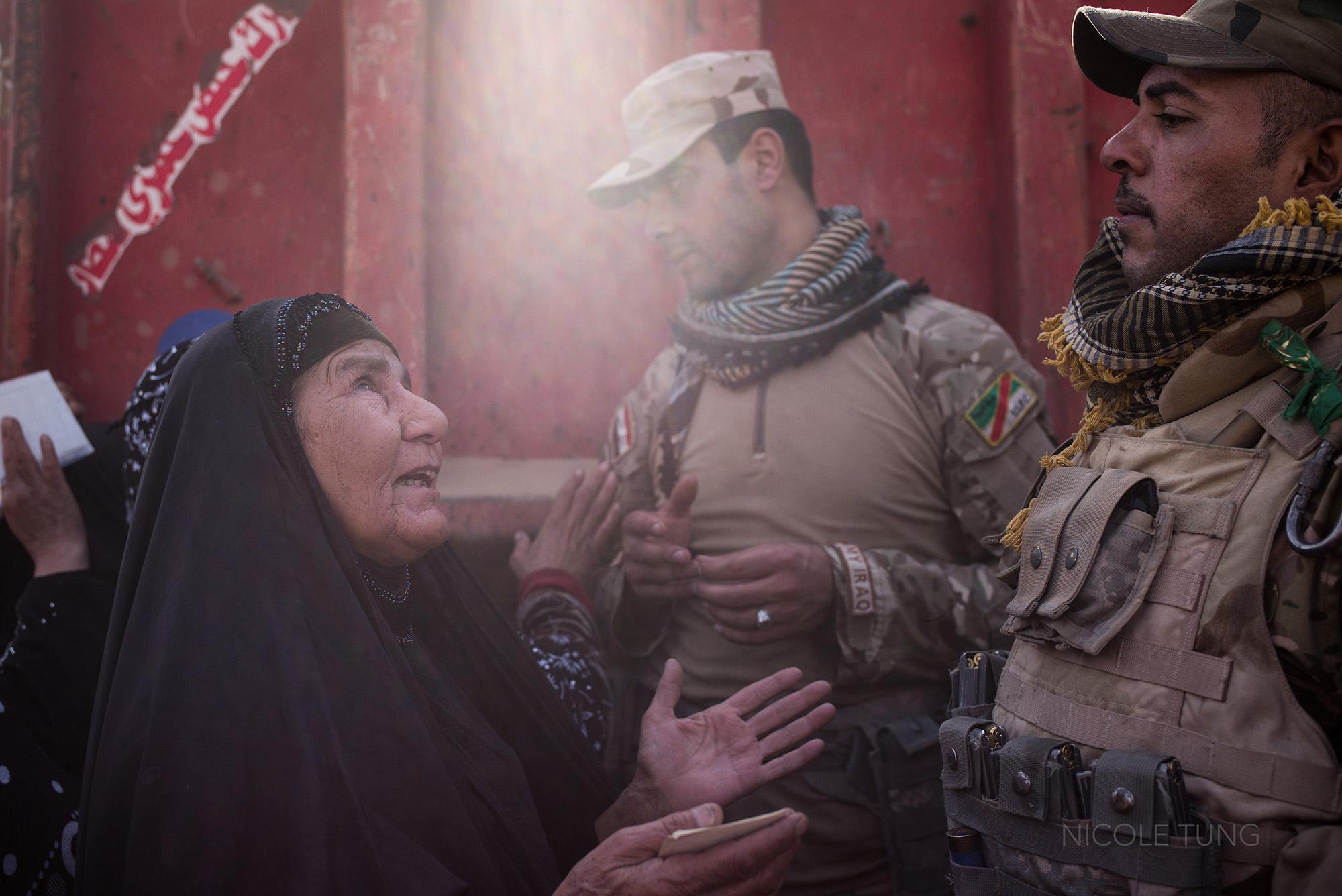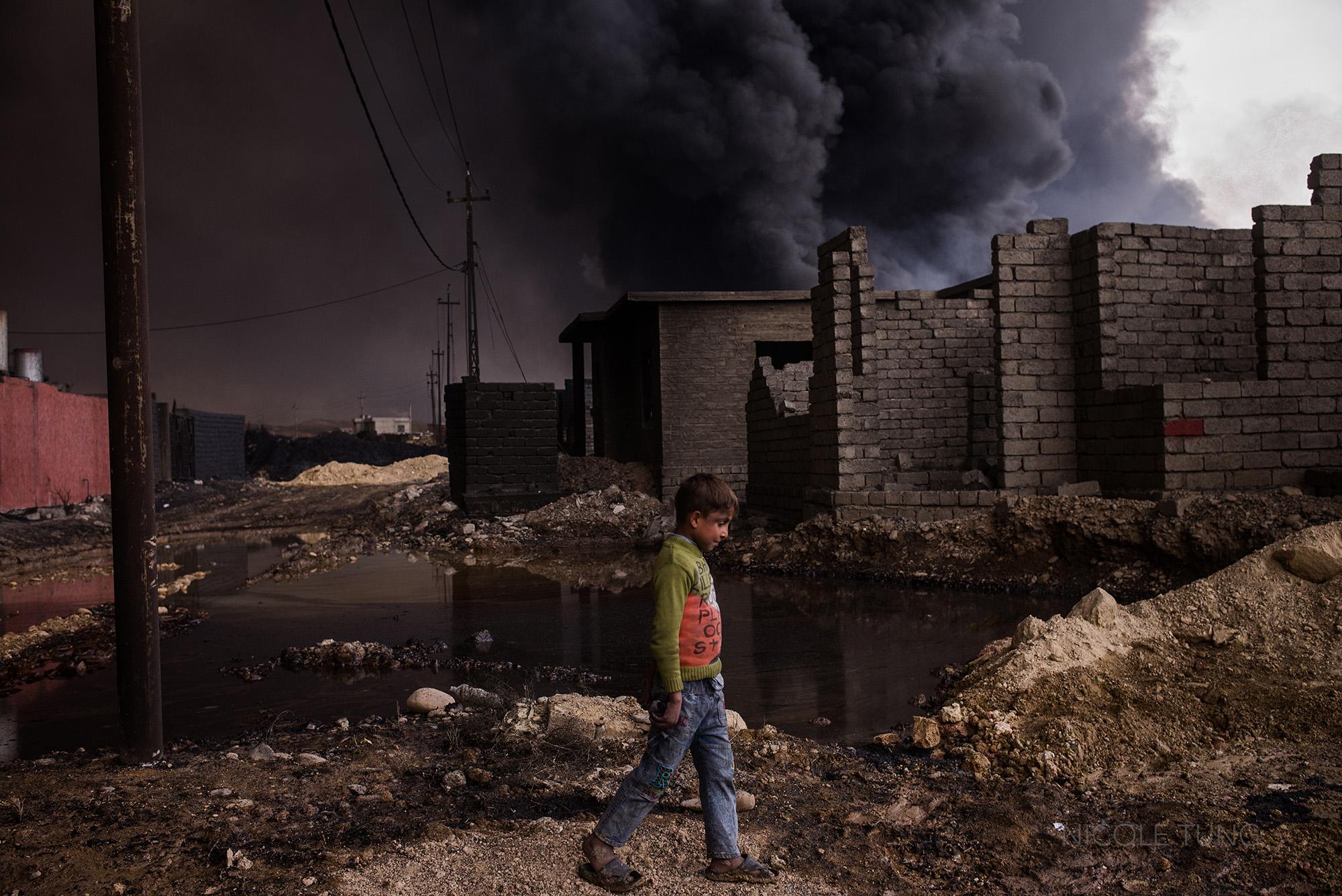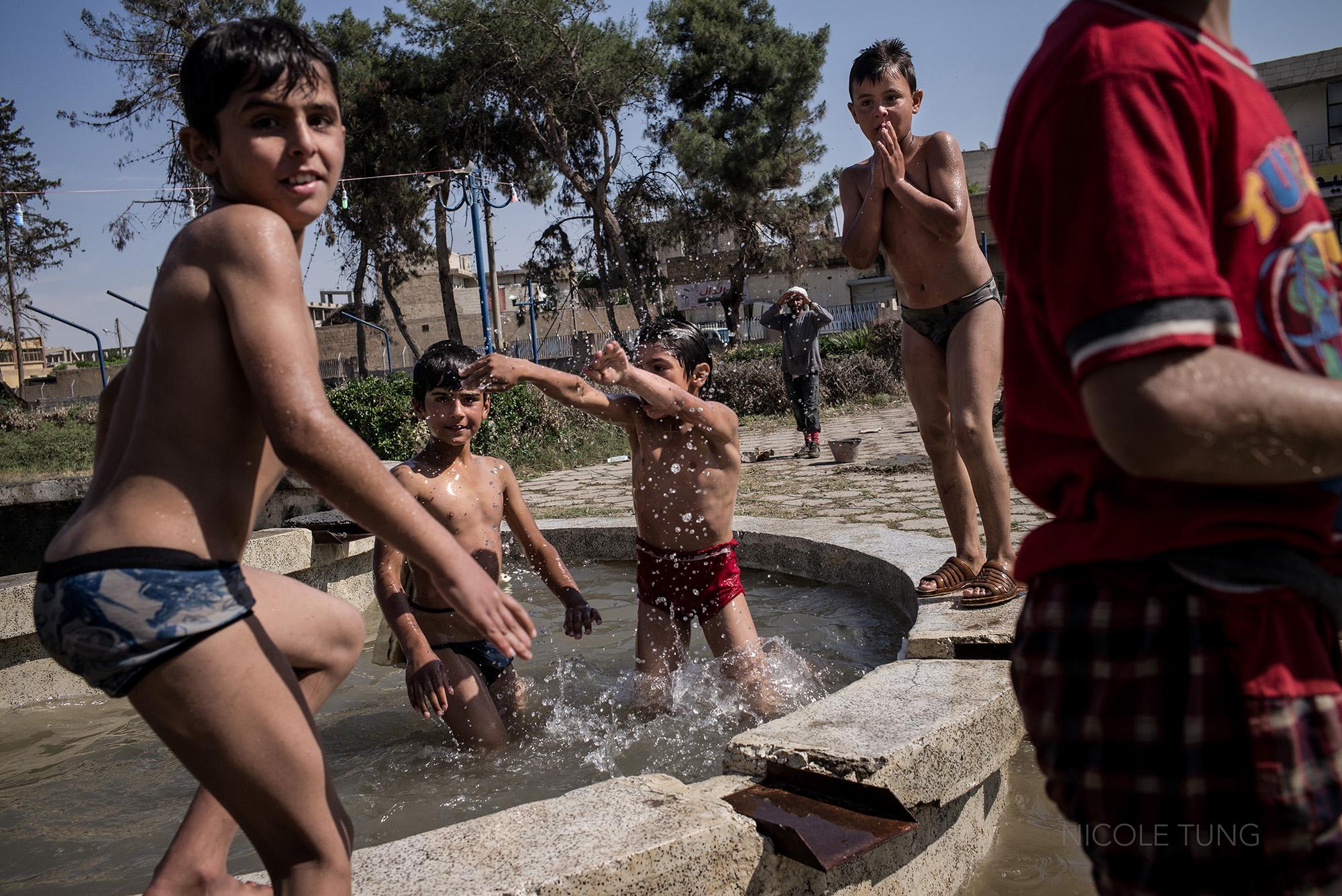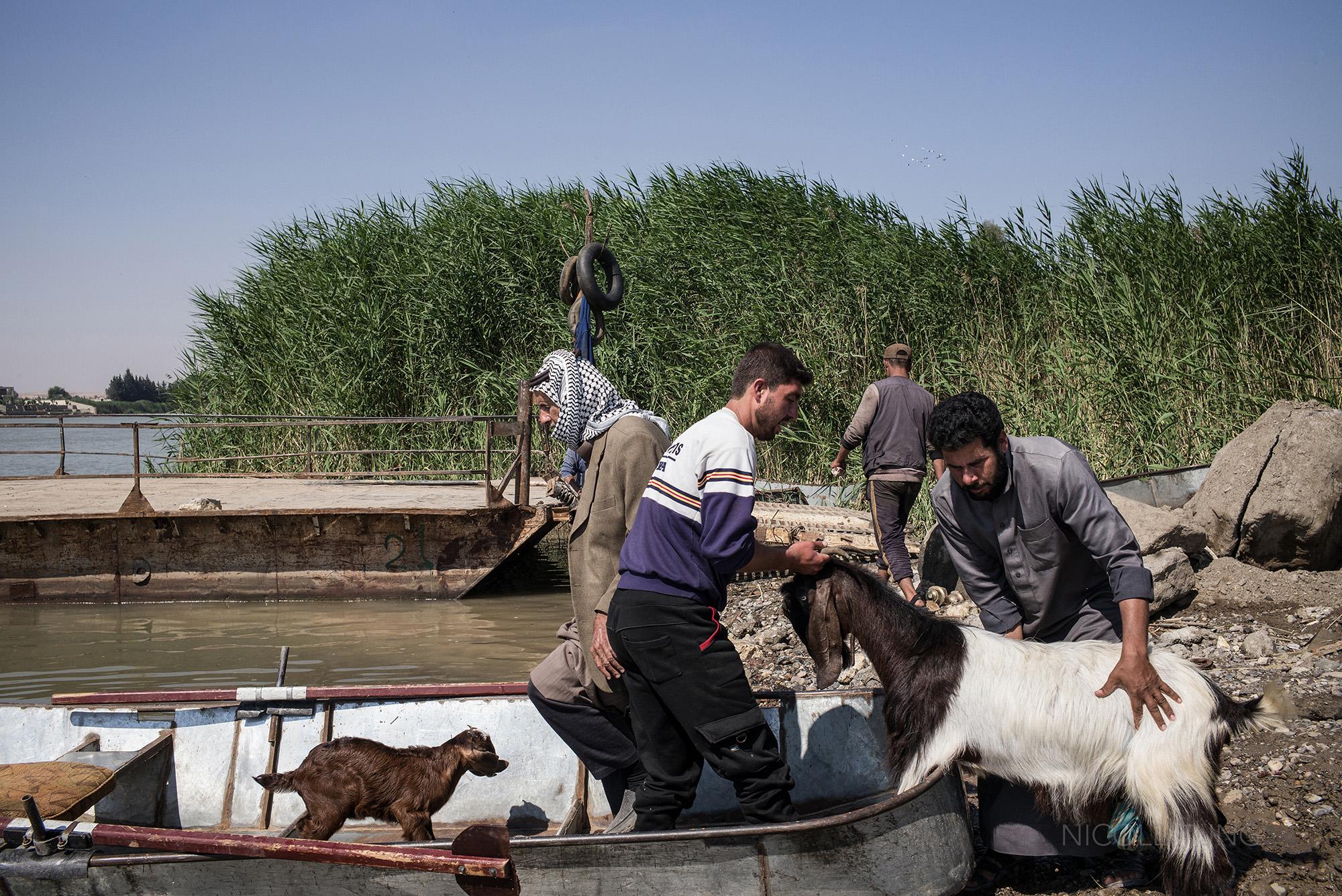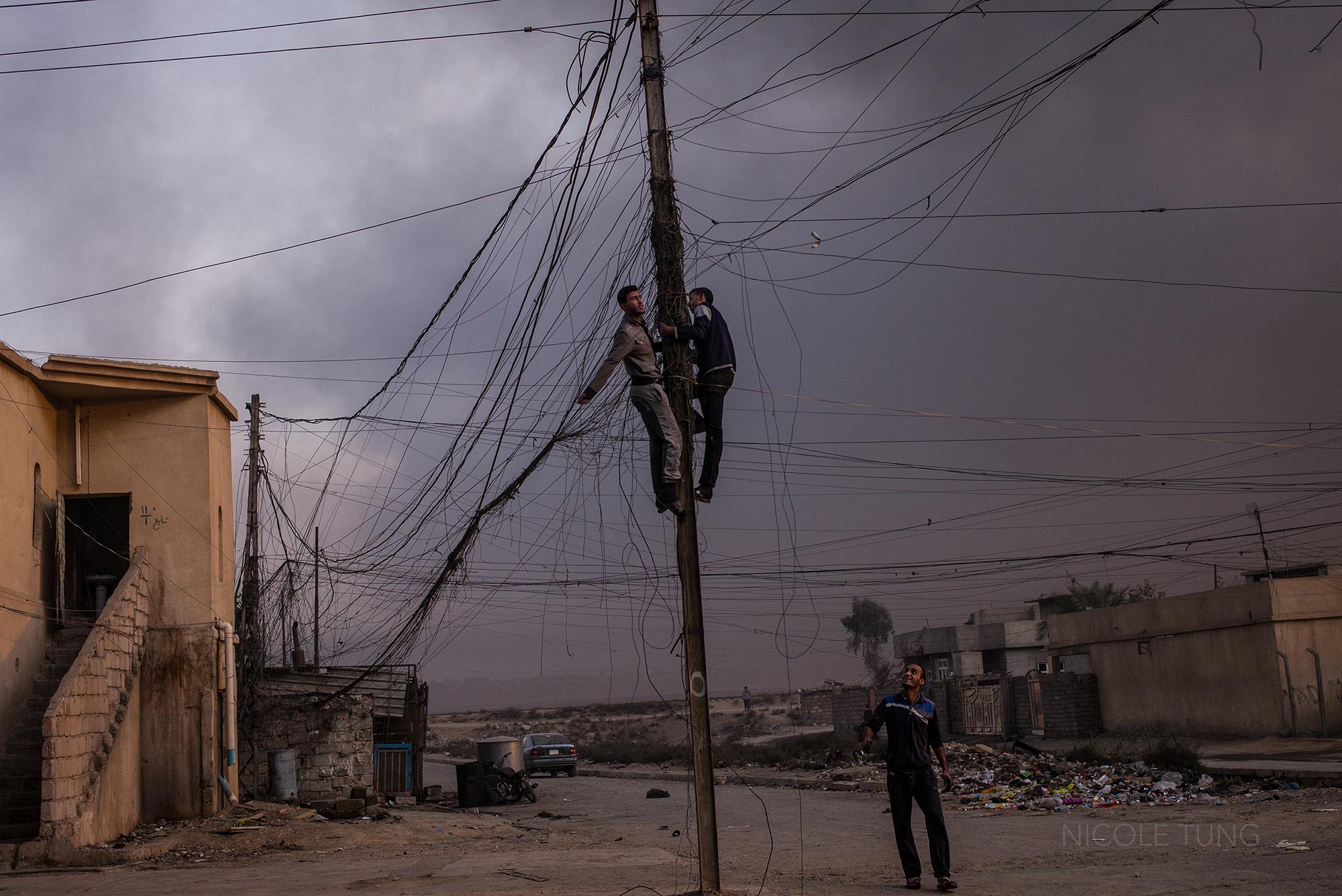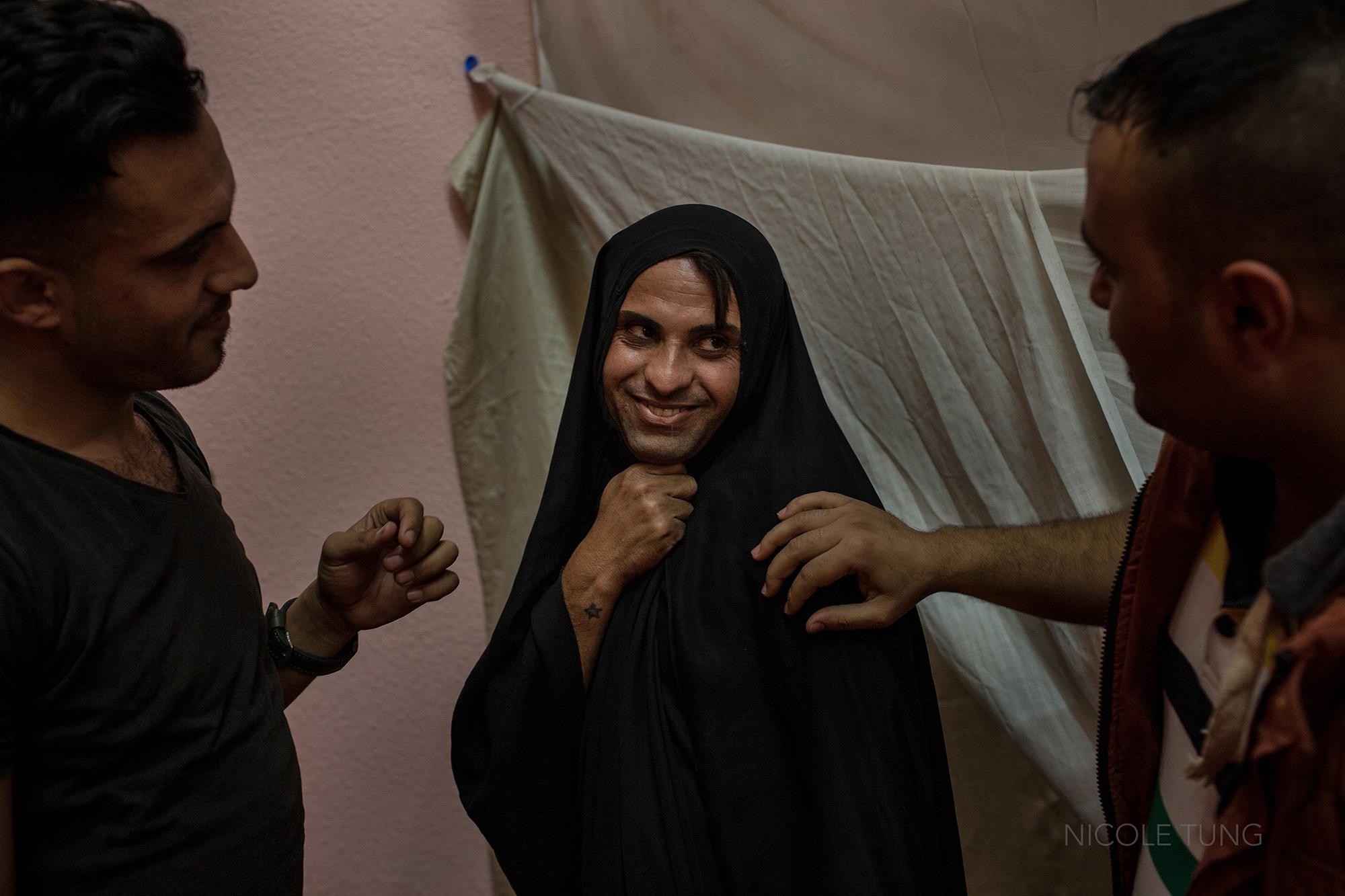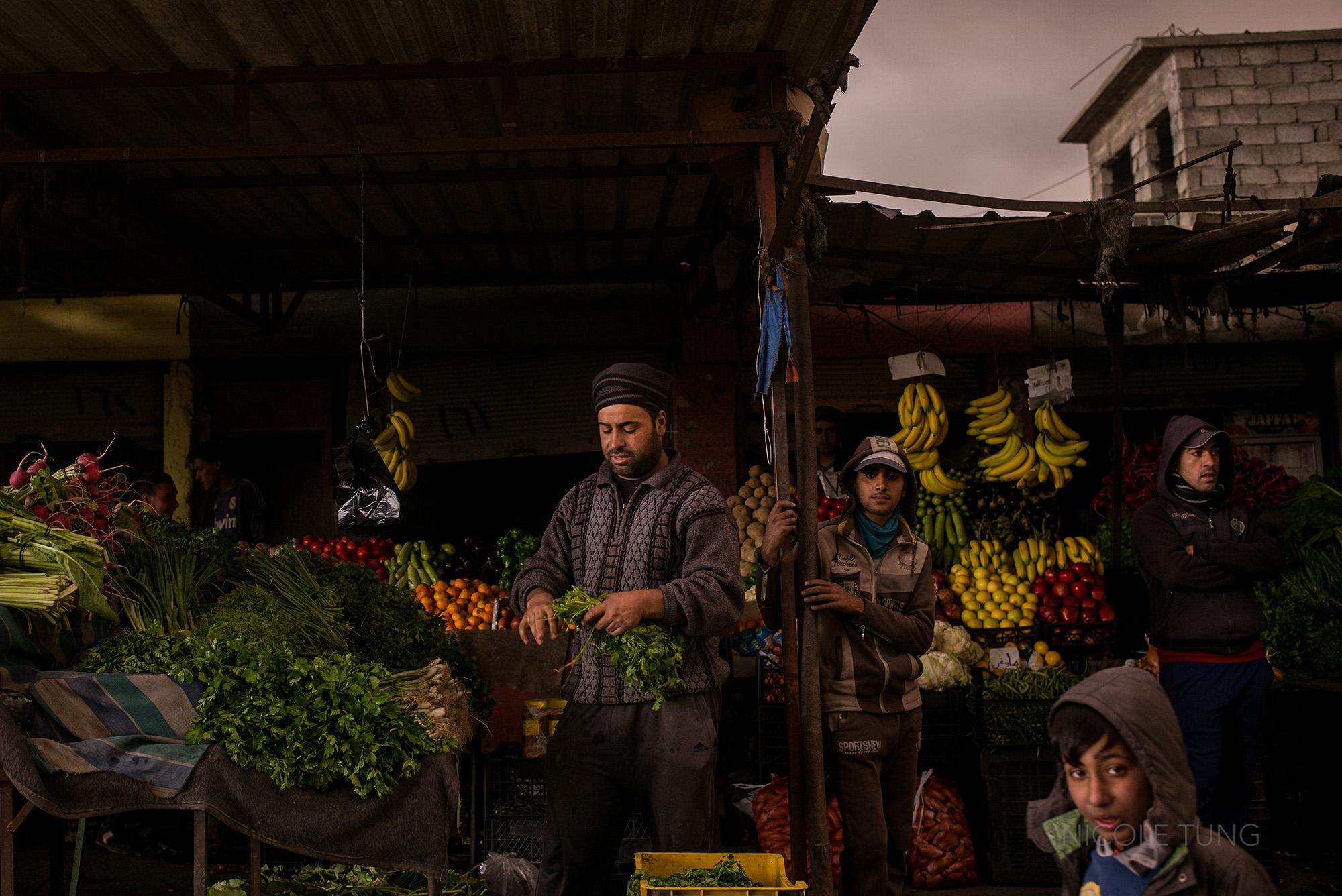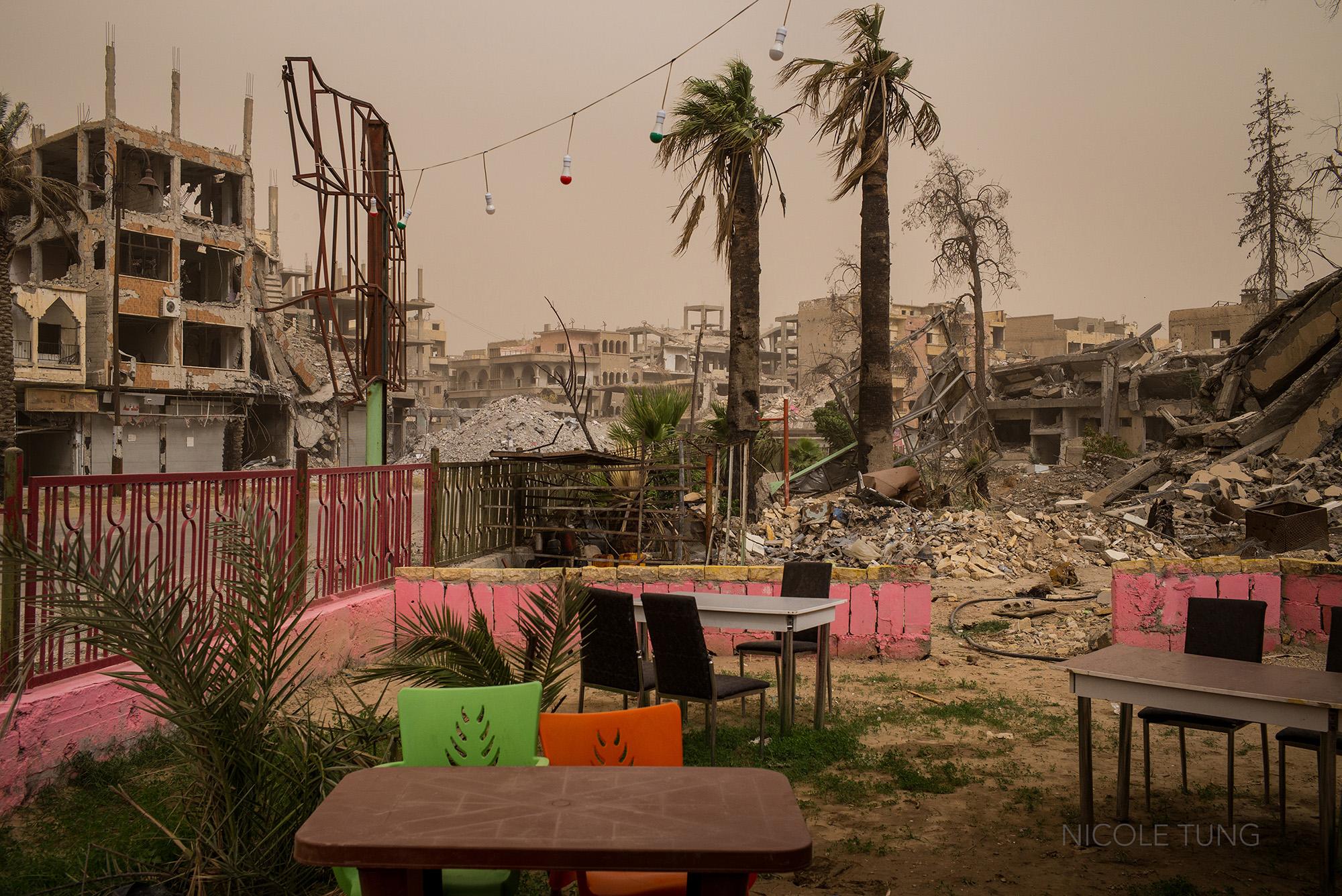As Strong as the War, As Soft as the Peace
Twisted rebar and rubble are seen at the destroyed shrine of Nebi Yunus, or the Prophet Jonah, in Mosul, Iraq. The shrine was considered one of the most sacred sites to Moslawis before it was blown up by ISIS militants in 2014, who deemed the site heretical. November 2017.
Schoolchildren exit a bus in western Mosul, Iraq. Since Mosul was declared liberated by the Iraqi forces four months ago, some schools have reopened in the city where many children have missed years of their education. November 2017.
Life after ISIS: Men bathe in thermal baths in Hammam al Alil two days after Iraqi forces liberated the town from ISIS as they retreat further into Mosul. As the offensive to retake Mosul continues, over 40,000 civilians have been internally displaced, straining already overloaded camps in the region. Hammam al Alil, under ISIS control for over two years, has seen the return of a trickle of civilians to their homes despite improvised explosive devices left behind and sporadic fighting between ISIS recruits and Iraqi forces. November 2016.
Construction workers remove rubble from a destroyed building in Raqqa, Syria. May 2018. An estimated 80 percent of Raqqa's infrastructure was destroyed or damaged during the offensive to retake the city from ISIS, with thousands of lives lost in aitstrikes by the coalition, addition to those civilians who were executed by ISIS during their reign over the city from 2014 until their ouster in 2017.
Young men dance at restaurant in the predominantly Kurdish city of Kobane, Syria. June 2018.
A fighter with the US backed Syrian Democratic Forces walks through the destroyed town of As Susah in Syria. ISIS was ousted from As Susah only weeks before, as the extremist group retreated into the last sliver of territory in Baghouz along the Euphrates in south eastern Syria after a months long campaign was launched to defeat the Islamic State in Syria. While the group has lost its territory, it is already laying the groundwork for an insurgency. February 2019. The Syrian Democratic Forces (SDF) with the support of the US-led coalition have been in a weeks-long campaign to drive out the last of the Islamic State fighters in Baghouz, who now control less than a 1.5 square mile of territory along a small portion of the Euphrates River near the Syrian border with Iraq. According to some of the civilians, ISIS blocked people from leaving the village, as fighting, the lack of food and clean water prompted dozens to leave.
A convoy of men fleeing from Mosul are taken off a truck to be searched and checked against a wanted list of suspected ISIS fighters near the town of Gogjali, Iraq. Iraqi security forces have been conducting rigorous checks on fleeing civilians to ensure they were not collaborating with ISIS, but their methods of interrogation have drawn criticism from rights groups such as Amnesty International, saying that torture and executions of Sunnis is in part due to revenge attacks. November 2016.
Khaled Mohamed and his bride-to-be step out of the bride's house before their wedding ceremony in Mosul, Iraq. Both Khaled and his brother Hashem (not pictured) married their fiancees on the same day surrounded by family and neighbors. Before the wedding party left their family home to receive the brides, the grooms' father discouraged the guests from reveling too loudly or making too big a scene as a sign of respect to the residents of Mosul still mourning their loss and the dead. November 2017.
A view of damaged buildings seen through the rain, in Raqqa, Syria. May 2018. Seven months after ISIS was ousted from their capital, civilians are returning to rebuild their lives and homes. Without a visible presence of NGOs or strong support from the coalition because of ongoing security concerns, the city’s residents and civil council and municipality have taken it upon themselves to clean up the rubble and reopen stores in time for Ramadan. An estimated half of the 400,000 civilians - the number of people who were in the city before coalition airstrikes began last June — have returned to a city devastated by airstrikes, street battles, and unexploded ordinance, including mines and booby traps left behind by the extremist militias. Infrastructure like bridges connecting the northern and southern parts of the city have been destroyed, forcing people to use flimsy barges to transport their vehicles, crops, and other goods to the city center. Late rains this year have also compounded the city’s woes as it relies heavily on agriculture. Bodies also remain under the rubble, worsening fears that disease could easily break out as the weather becomes warmer.
Members of the Mosul Civil Defense remove rubble with an earth mover to recover bodies of civilians in the Old City of Mosul, Iraq. At least six people from two different families, including three children, were killed when an airstrike hit their homes during the offensive. November 2017. Dozens of bodies of both fighters and civilians remain in the Old City, many trapped under the rubble. However, suspected ISIS fighters are left to rot in the street, whereas civilians are recovered by the morgue and the Mosul Civil Defense for the families to bury them. In the aftermath of the war against ISIS, Iraq's task of recovering, and identifying the dead is huge and complicated. Civilians must obtain several permissions and provide evidence that they were not ISIS fighters, in order to recover their relatives from under the rubble. It is a laborious task, and extremely under-funded as the Mosul Civil Defense in particular are not given the resources they need by the central government to carry out the dangerous work they do. In addition to the bodies under rubble is the question of identifying those found in mass graves dug by ISIS, which forensics teams are struggling to do as they too, lack funding and the necessary equipment to do their work.
Members of the Raqqa Civil Defense pray before at least 15 bodies and remains of people they retrieved from a mass grave, before reburying them in a cemetery further away from the city center, as seen in Raqqa, Syria. June 2018. Most of the bodies found at this particular location were likely to have been civilians killed in coalition airstrikes.
Soldiers of the Iraqi Federal Police man a checkpoint amidst the destruction of the Old City in Mosul, Iraq. The Iraqi Federal Police, who answers to the Iraqi Ministry of Interior, worked in tandem with the Iraqi military during the offensive to retake Mosul, and continues to have the largest presence of all the security apparatus to ostensibly maintain security. The Federal Police, whose ranks are a majority of Shia, have also been accused of abusing, torturing, and executing Sunni civilians who were attempting to flee the city as the fighting intensified between 2016-2017. The Federal Police are accused of killing and detaining dozens of ordinary civilians, who were suspected of being ISIS members. November 2017.
Women, some suspected of being ISIS family members, are seen at a screening point near Baghouz, Syria. February 2019. The Syrian Democratic Forces (SDF) with the support of the US-led coalition have been in a weeks-long campaign to drive out the last of the Islamic State fighters in Baghouz, who now control less than a 1.5 square mile of territory along a small portion of the Euphrates River near the Syrian border with Iraq. According to some of the civilians, ISIS blocked people from leaving the village, as fighting, the lack of food and clean water prompted dozens to leave.
A fighter with the Syrian Democratic Forces loads RPG heads into the back of a pickup truck - headed for the frontline in Baghouz - at an SDF base in As Susah, Syria. February 2019. The Syrian Democratic Forces (SDF) with the support of the US-led coalition have been in a weeks-long campaign to drive out the last of the Islamic State fighters in Baghouz, who now control less than a 1.5 square mile of territory along a small portion of the Euphrates River near the Syrian border with Iraq. According to some of the civilians, ISIS blocked people from leaving the village, as fighting, the lack of food and clean water prompted dozens to leave.
A boy collecting scrap metal and wood carries window frames through the streets of Raqqa, Syria. June 2018. With so much rubble and debris left over from coalition airstrikes, many residents have taken it upon themselves to gather up metal, wood, and other goods to sell and earn a little bit of money.
Sheikh Abu Osama Qawsiyet, left, is surrounded by other Sunni tribal leaders gathered for a meeting in a village of northern Mosul, Iraq. November 2017. The question over the future of Mosul and Sunni areas within Iraq, a Shia dominated country, rests heavily on the ability of the Sunni tribes and the the Iraqi central government in managing their relationship. When ISIS took over parts of western and northern Iraq in the summer of 2014, many Sunnis initially sympathized with the extremist group as they offered what the Shia Iraqi government could not, and their conditions were exacerbated by years of drought and discrimination in both the government and armed forces. For years, since the fall of Saddam Hussein's regime in 2003, the Sunnis have felt marginalized in their own country not only because of the policies of the government, but also because of, and especially, the encroachment of the Kurds on their territories and rights. "When we gather, we discuss the crisis that we are in, and the problems we face. We've been here for a long time, as tribal leaders and the sons of tribal leaders," starts Sheikh Abu Osama Qawsiyet, of the Hadidi tribe. He continues, discussing the problems the Sunnis are facing with the Kurds, who are In the Nineveh Plain, the Kurds have forced Sunni Arabs to leave their villages because they have big media - the same as the Shia - but the Sunnis don't. Our suffering is caused by both sides." "The Sunni cities have gone from invasion to invasion. First it was the Americans. Then it was the Shia [government], then ISIS, and now the [Kurdish] Peshmerga," said Sheikh Qawsiyet. "All we want from the government is to enable us to see our future. We just need the villages, destroyed by the Peshmerga, to be rebuilt and to bring stability to the people who have been displaced." "The Sunnis have no authority in the security forces, and it's only a 'compliment' that some Sunnis are there. It's just to say that we are a part of
Civilians use barges to transport their cars, crops, and other goods across the Euphrates River as seen in Raqqa, Syria. Many of the main bridges in the center of Raqqa that previously connected the northern and southern halves of the city were destroyed in coalition airstrikes. June 2018. Eight months after ISIS was ousted from their capital, civilians are returning to rebuild their lives and homes. Without a visible presence of NGOs or strong support from the coalition because of ongoing security concerns, the city’s residents and civil council and municipality have taken it upon themselves to clean up the rubble and reopen stores in time for Ramadan. An estimated half of the 400,000 civilians - the number of people who were in the city before coalition airstrikes began last June — have returned to a city devastated by airstrikes, street battles, and unexploded ordinance, including mines and booby traps left behind by the extremist militias. Infrastructure like bridges connecting the northern and southern parts of the city have been destroyed, forcing people to use flimsy barges to transport their vehicles, crops, and other goods to the city center. Late rains this year have also compounded the city’s woes as it relies heavily on agriculture. Bodies also remain under the rubble, worsening fears that disease could easily break out as the weather becomes warmer.
A bus driver is reflected in the mirrors in Raqqa, Syria. Public buses in Raqqa, which are damaged by bullet holes, have began running again on one route - although only in a very small capacity - to help service the civilian population. May 2018.
Civilians are seen in the streets of Haijin, Syria. Haijin was held by ISIS until recent weeks when the Syrian Democratic Forces, with the help of the U.S.-led coalition, ousted the extremist group from this major town in eastern Deir Ezzor province. Following the end of ISIS's reign in Haijin, civilians have begun trickling back into the area despite the threat of unexploded ordinance and ISIS sleeper cells. February 2019. The Syrian Democratic Forces (SDF) with the support of the US-led coalition have been in a weeks-long campaign to drive out the last of the Islamic State fighters in Baghouz, who now control less than a 1.5 square mile of territory along a small portion of the Euphrates River near the Syrian border with Iraq. According to some of the civilians, ISIS blocked people from leaving the village, as fighting, the lack of food and clean water prompted dozens to leave.
Osama Abdulmonem, 27, readies a wedding dress for display in his shop in Mosul, Iraq. Abdulmonem's shop remained open under ISIS but he had to sell used dresses as there was no way of importing new material or ready-made ones from outside of the city, especially Turkey, where he usually acquires them. "Business was good even under ISIS, but we were working for them and some had four wives," says Abdelmonem. "I also had to sell them with the khimar [the all black face covering] and would be imprisoned, just like that, if I didn't. I also couldn't use mannequins to display the dresses because they were banned," he said. November 2017.
Men sit in a tea house smoking and playing dominoes in east Mosul, Iraq. The tea house remained open during ISIS's rule over the city from 2014, but no board games, dominoes, or any other entertainment was allowed. The owner of the cafe, Tamer Suleiman, says he could only serve tea. Smoking of cigarettes and shisha - the water pipe so ubiquitous throughout the Middle East - was also banned by the extremist group. The cafe now has all of this back, including dominoes, backgammon, a television, and shisha. November 2017. "Under ISIS, most people didn't leave their houses to come here - even to drink tea - because the Hisbah (ISIS morality police) searched for people who didn't grow beards or who weren't wearing appropriate clothes according to their rules," said Tamer Suleiman, the owner of the cafe who has kept it running for seven years. "Whenever people heard that the Hisbah were coming, the tea house would immediately clear out. Most days, business was already slow. When they [the Hisbah] came, no one was here." The morality police would frequently search Suleiman's shop to see if there were cigarette butts left over and to make sure they didn't smell anything resembling cigarette smoke. "One guy threatened to imprison me if he found anything," Suleiman recounted. "After liberation, I was reborn into this new situation we have now. There is nothing more we want than just living like any human being and being able to practice our daily lives," he said.
A soldier with the Yazidi 'Sun Ladies' brushes her hair during morning preparations at their base near Sinjar, in Kurdistan, Iraq. August 2016. The 'Sun Ladies' battalion are made up of several hundred Yazidi women, some who were formerly enslaved by ISIS. They are attempting to fight back against the extremist group with the help of the Kurdish Peshmerga through training, funds, and arms.
A mother cries while she cradles her son Laith, whom she had not seen for two years as they were finally reunited at the Hassan Sham camp for internally displaced persons near Mosul, Iraq. Laith was trapped in Mosul when it fell to ISIS in 2014. Laith’s mother, who could not go back to their home in Mosul, was forced to stay outside of ISIS territory, longing for the day to see her son again. November 2016.
Children play on the rubble of what was once a stadium in Qayyarah, Iraq, as a constant cloud of smoke hangs over the sky. The stadium, which was used by ISIS to hide their weapons stockpiles was destroyed by coalition airstrikes over the summer and oil wells were set on fire as ISIS fighters retreated. November 2016.
Female students are seen in class at the heavily damaged Hawari Bu Medyan School, in Raqqa, Syria. May 2018. The school is located opposite a building that was used by ISIS's religious police, the Hisba, and was also the site of intense fighting during the offensive to retake the city from the extremist group. The school reopened in January 2018.
Children play in the courtyard at the heavily damaged Hawari Bu Medyan School, in Raqqa, Syria. May 2018. The school is located opposite a building that was used by ISIS's religious police, the Hisba, and was also the site of intense fighting during the offensive to retake the city from the extremist group. The school reopened in January 2018.
An elderly woman pleads with a soldier of the Iraqi Army's Ninth Division to give local civilians food aid in the Entisar neighborhood of Mosul, Iraq, just meters from the frontline where Iraqi forces are in engaged in fighting with ISIS in Hay Salam. November 2016. A helicopter strafed nearby buildings where ISIS snipers were positioned. 1 million civilians are estimated to be in Mosul, where many have been prevented from leaving by ISIS, while others have remained in their homes rather than fleeing to internally displaced persons camps. The presence of so many civilians inside the city has slowed the offensive, which began last month against the extremist group in taking back the so-called capital of their caliphate. For the civilians who remain, they face food shortages and the constant threat of being caught in the crossfire.
A boy walks through a street near his home in Qayyarah, Iraq, as an oil well burns nearby. Many streets and neighborhoods in Qayyarah look apocalyptic, with oil residue covering all surfaces, turning small streets into muddy oil slicks, yet children can still be seen everywhere playing outside. Dozens of oil wells were set on fire as ISIS fighters retreated from the Iraqi Army in August, before the start of the Mosul offensive last month. The oil from Qayyarah provided a huge source of income for ISIS to help finance its activities. Many civilians stayed in their homes during the fight to retake the town and remain there today despite the months of smoke clouds hanging over the town. November 2016.
Young boys swim and play in a fountain in a park in Raqqa, Syria. May 2018. Public parks in Raqqa were used as impromptu burial sites for those killed in executions carried out by ISIS during their reign, or airstrikes by the coalition during the offensive to oust the extremist group from the capital of their so-called caliphate. Many parks still contain the remains of hundreds of people, as well as unexploded ordinance. But as life comes back to this eastern Syrian city, rather than be deterred, civilians are eager to have some semblance of normal life and enjoy their freedom outdoors.
Men load livestock onto a small boat on the north bank of the Euphrates River in Raqqa, Syria. May 2018. Seven months after ISIS was ousted from their capital, civilians are returning to rebuild their lives and homes. Without a visible presence of NGOs or strong support from the coalition because of ongoing security concerns, the city’s residents and civil council and municipality have taken it upon themselves to clean up the rubble and reopen stores in time for Ramadan. An estimated half of the 400,000 civilians - the number of people who were in the city before coalition airstrikes began last June — have returned to a city devastated by airstrikes, street battles, and unexploded ordinance, including mines and booby traps left behind by the extremist militias. Infrastructure like bridges connecting the northern and southern parts of the city have been destroyed, forcing people to use flimsy barges to transport their vehicles, crops, and other goods to the city center. Late rains this year have also compounded the city’s woes as it relies heavily on agriculture. Bodies also remain under the rubble, worsening fears that disease could easily break out as the weather becomes warmer.
Local civilians attempt to reconnect power lines to bring electricity back to the town of Qayyarah, Iraq, as a constant cloud of smoke - from burning oil wells - hang in the sky. Many streets and neighborhoods in Qayyarah look apocalyptic, with oil residue covering all surfaces, turning small streets into muddy oil slicks. Dozens of oil wells were set on fire as ISIS fighters retreated from the Iraqi Army in August, before the start of the Mosul offensive last month. The oil from Qayyarah provided a huge source of income for ISIS to help finance its activities. Many civilians stayed in their homes during the fight to retake the town and remain there today despite the months of smoke clouds hanging over the town.
Actors joke with each other while discussing how to wear a woman's abaya (full body covering common in Iraq), before the start of their show depicting the life of Hammurabi in Mosul, Iraq. Hammurabi was the Babylonian king who reigned in the 1700s B.C., and established the Hammurabi Code, one of the earliest known written codes of law. November 2017. The cast of actors, under the direction of Rafit Al-Sunayd, have shown four plays, open to the public, since the end of the offensive to retake Mosul from ISIS, in July 2017. The two shown at the beginning were mockeries of ISIS, and almost all of the actors were students at the College of Fine Arts at Mosul University. ISIS expelled all the students at the college when they took over, and destroyed their department. "We made these plays about ISIS so soon after liberation because I was jailed by them for 72 days. We lived it, and therefore we felt it needed to be expressed," said actor Omar Akram. He continued: "We aren't from any production company, but we all have degrees in acting, so we gathered our own resources to bring joy and critical thinking about politics." "Hammurabi was an iconic character in our forgotten ancient land," said Akram. "Stories like this need to be seen, and we also need to attract tourists to come and see what our society is like. We can't just depend on oil." The director, Al-Sunayd, decided that depicting Hammurabi was right for the time. "It's about how he put laws in place to make sure everyone had their own rights. We transitioned from old times to now, and to see how things have changed in regards to freedom of speech, and other rights, is important," he said. The auditorium where the play is shown was donated as it was the only one which survived the war. It was previously used for weddings. Al-Sunayd continued: "As for peace, you can't do anything without peace. You can't sleep, eat, walk to the end of the street. Peace is our language."
A vegetable seller tends to his stall under a darkened sky in Qayyarah, Iraq, as oil wells burn nearby. Many streets and neighborhoods in Qayyarah look apocalyptic, with oil residue covering all surfaces, turning small streets into muddy oil slicks, but civilians go about their daily lives as best they can. Dozens of oil wells were set on fire as ISIS fighters retreated from the Iraqi Army in August, before the start of the Mosul offensive last month. The oil from Qayyarah provided a huge source of income for ISIS to help finance its activities. Many civilians stayed in their homes during the fight to retake the town and remain there today despite the months of smoke clouds hanging over the town. on November 2016.
A newly opened cafe stands in contrast to the backdrop of a destroyed city in Naim Square, Raqqa, Syria. May 2018. Naim Square was a hub of social life before it became a symbol of ISIS's brutality, where the extremist group would carry out public executions.
